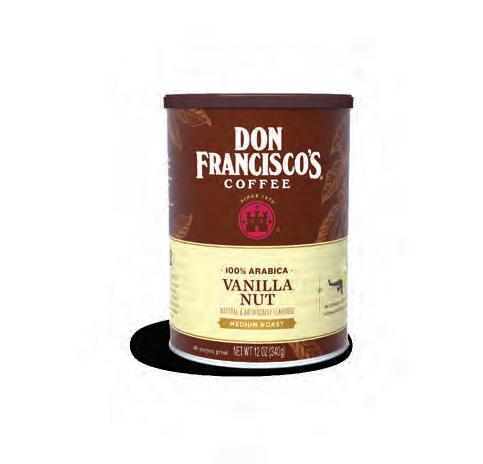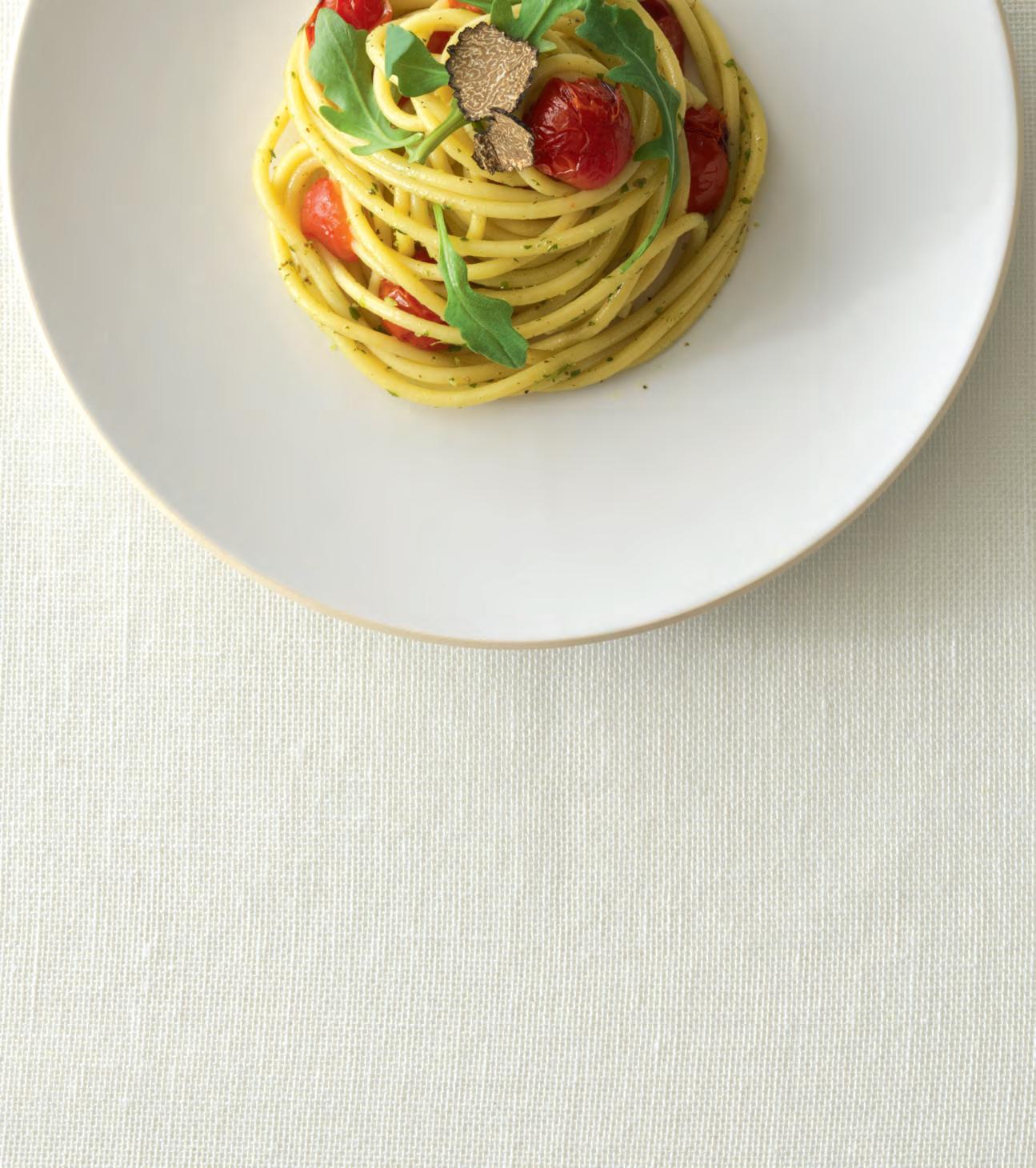FAST AND EASY LUNCHES… WITH COOL LUNCHBOXES, TOO PG. 40
FOR












FAST AND EASY LUNCHES… WITH COOL LUNCHBOXES, TOO PG. 40
FOR











Who doesn’t like toys? We’ve all grown up with them in some form, and as we age, the types of toys we like to play with morph with our interests. My fondest memories are playing “stuffed animals” with my little sister, where we would pull out our large collection of soft creatures and create a community where they would “talk” and “play.” That morphed to Barbie dolls, with their fashionable outfits (many sewn by my grandmother), high heels, and plenty of fancy parties and balls. Throughout my childhood, there were always board games, card games and puzzles, too.
As an adult, my toys are now my bikes, my skis, my hiking boots, my yoga mat. Gardening tools are toys, too, as they get me out playing in the garden. I still play cards and some board games, but they’re far from the days of Candy Land and Crazy Eights. And I would be remiss not to mention that some of my favorite playthings are the ever-growing array of gizmos and gadgets in my kitchen.
The scissors with multiple blades to finely trim up fresh herbs. The greens and herb “stripper” with different-sized holes to pull through stalks of kale, chard or fresh herbs to peel them off the stalk. The cannoli-looking rubber tube that peels garlic when you press and roll cloves in it. The small plate with a jagged, toothy surface for grating ginger, horseradish and other root herbs.
Then there are my go-to appliances. The Cuisinart I’ve had since college (and replaced a few parts on), for pureeing soups and blending sauces and pesto. A Crock-Pot for those throw-in-a-bunch-of-ingredients meals that will be waiting for me and my husband at the end of the day. A juicer that lets me constantly experiment with ingredient combos, from fruits and veggies to nuts and herbs, to create tasty, healthful concoctions. And my new favorite: a SodaStream to bubble up fizzy water—which I drink constantly—anytime.
This array of toys has turned my kitchen into a cooking playground. And I always have my eyes open for more. That’s why each issue we strive to test and highlight cool, interesting, handy kitchen tools and appliances that make cooking more fun. Check out our picks for spring on page 30.

Also in this issue: Remember when we hosted a vegan-recipe contest last spring? We had more than 500 entries and narrowed them down to our top 21. In this issue, we’re pleased to share a number of those winning recipes (pages 45–48), and you can now download an ebook of all the winning recipes on our website at livenaturallymagazine.com/ vegan-recipe-ebook.
We’ve got more recipes, too, inspired by seasonal spring ingredients (pages 36–38), along with fast and easy lunches (40–43). Plus our usual collection of health, wellness, and nutrition stories and news. So, turn the pages, and enjoy this issue. Be sure and pick a few of our recipes, and get playing in your cooking playground!
Rebecca Heaton, Editor editor@livenaturallymagazine.comEasy Steps to Eating Vegan
PLUS Detoxing tips, fuel for active kids, all about essential fatty acids and sustainable gear.

Protein Bars and Cold-Brew Coffee

PLUS An education on eggs, spring cleaning tips, and new kitchen gadgets and cookbooks.

EAT
Dish It Up Spring into colorful and tasty seasonal recipes, courtesy of the budding chefs at Johnson & Wales University.
Fast & Flavorful
Easy lunches you definitely have time to make.
Healthy Kitchen
Recipe winners from Live Naturally and Vegan Fusion’s veganrecipe contest.
Around the World
Many of Italy’s most famous foods come from the region of Puglia.
Ashwagandha
This Indian herb eases stress, regulates moods and more.
Stop Spring Sneezes
Natural ways to fend off allergies before they start.
Enhance Absorption
How to get the most out of supplements.





Part of the Live Naturally family of Kroger magazines
SPRING 2019 livenaturallymagazine.com

COFOUNDERS
Drs. James and Debra Rouse
VICE PRESIDENT & GROUP PUBLISHER
Deborah Juris
EDITOR
Rebecca Heaton
ART DIRECTOR
Lindsay Burke
DESIGNER/DIGITAL
Shannon Moore
ASSISTANT EDITOR
Kellee Katagi
DIGITAL EDITOR
Lauren Yeates
DIGITAL PRODUCTION ASSISTANT

Ashley McLeod
COPY EDITOR
Julie Van Keuren
MARKETING OPERATIONS MANAGER
Susan Humphrey
CONTRIBUTING WRITERS
Lisa Beach, Nancy Coulter-Parker, Dina Deleasa-Gonsar, Genevieve Doll, Kellee Katagi, Kara Nielsen, Robin Roenker, Debra Rouse, Rebecca Treon
CONTRIBUTING ARTIST AND STYLISTS
Aaron Colussi, Eric Leskovar, Nicole Dominic
ADVERTISING SALES
Deborah Juris, Tracy McIlroy, Susan Tauster, Dan Vincent
Brendan Harrington
Raw Organic Protein is ideal for athletes looking to boost protein intake to support athletic activities, build muscle or supplement a low-carbohydrate diet.†
• Provides 22g complete, organic plant protein or 44% of Daily Value
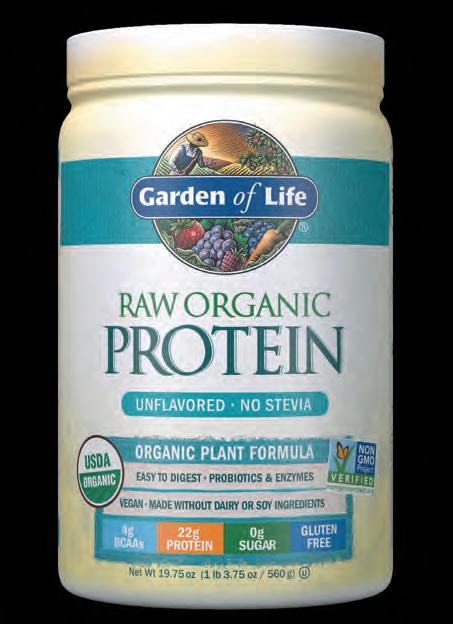
• Now smooth and creamy texture, made with organic peas from the USA
• 4g Branch Chain Amino Acids
• 3g of satisfying fiber and 0g sugar

• Live probiotics and Non-GMO enzymes


• Free of gluten, dairy, whey and soy
Available in four delicious flavors: Chocolate, Unflavored, Vanilla & Vanilla Spiced Chai










on the diet, his issues with diabetes flat-out disappeared. In my studies, my team has concluded it takes about four to five weeks for people to feel comfortable and solid converting to a vegan diet.
Another roadblock is when you’re on the road or traveling. When you have to eat at restaurants, think international: Italian pasta, Mexican burritos, Japanese vegetarian sushi, multiple vegetable Chinese dishes. There are options.
With a step-by-step approach, Dr. Neal Barnard shows how to make plant-based eating easy and fun.
BY REBECCA HEATONIn his new book The Vegan Starter Kit (Grand Central Life & Style, 2018), New York Times best-selling author and faculty member of the George Washington University School of Medicine Neal Barnard, M.D., explains the why and how of converting to a plant-based lifestyle...and how easy it can be.
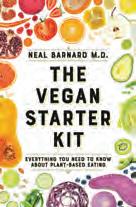
You are recognized as a leading medical authority on plant-based eating. Please share some history on your work and research in this area.
I have to confess: My early life didn’t prepare me for this. I grew up in Fargo, N.D., in a family of cattle ranchers. I was helped when my father got out of it and went to med school, which paved the way for me. My early research at National Institutes of Health (NIH) was on test diets for diabetes. My team discovered that a vegan diet was much simpler for patients to follow than the conventional limiting-calories-and-carbohydrates approach, and that it was more effective. So we decided: to heck with the other
approaches, and we applied vegan to diabetes, as well as treating other issues like cholesterol, blood pressure, menstrual pain and rheumatoid arthritis.

Why did you decide to write this book?
I’ve written many books, most of which are big enough to prop open a door. So, my goal was for people to be able to read this book in 45 minutes. I wanted to offer just enough information to give people confidence on how they can jump in on a healthy diet. I’ve organized the book to allow readers to make progress rapidly. I aim to answer the most common questions and address real-life situations when trying to eat plant-based,
such as grocery shopping, being on a budget, following a certain diet like gluten-free and eating out at restaurants. I’ve also compiled tried-andtrue recipes, with easy ingredients and instructions.
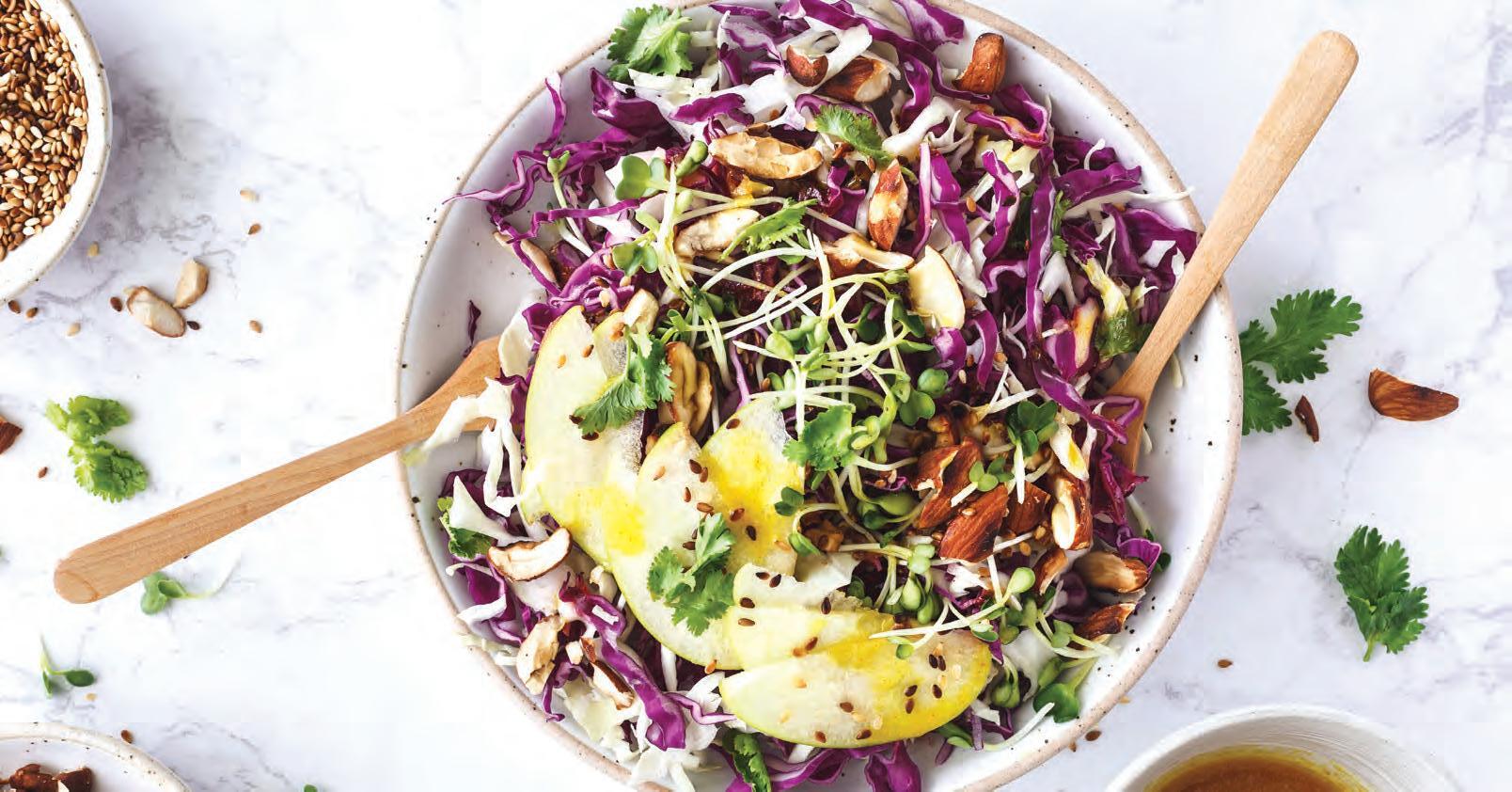
What do you see as the biggest roadblocks to eating vegan?
People imagine that it’s hard. On a scale of 0 to 10, trying to quit smoking is a 6 in difficulty, whereas changing to a plant-based diet is a 1 or 2. About 15 or 16 years ago, one of my researchers who had diabetes admitted that converting to vegan for his health was much easier than he would have thought. Instead of meat chili, he made bean chili, for example. Once
Could you offer a few starter tips for eating more vegan?
Take seven days and, while not taking anything out of your diet, write notes about which foods you might want to try that are free of animal products. If you use dairy milk, think about buying almond milk instead. At the sandwich shop, consider an option with all kinds of vegetables, but no meat or cheese. And so on. The idea is to familiarize yourself with all the vegan things you already like and to think about trying some new things.
Over the next three weeks, eat plant-based foods you identified that you like and rule out animal products completely. Incorporate transition foods. Instead of a hot dog, eat a veggie dog. Instead of sausage, veggie sausage. Instead of dairy, nut or soy milk and cheese. At the end of three weeks, you’ll discover you’re physically healthier: improved weight loss, better digestion and sleep, and more energy. Your tastes will also be changing.
When Kendra Bennett of Longmont-based Honey Bunchies honey and peanut bars shares the history of how the company launched, her story regularly elicits an “awww” from listeners. “Honey Bunchies were developed by my dad, who was trying to recreate a snack his mom made for him. He didn’t have a recipe, so he spent three months in the kitchen guessing,” Bennett explains. He never quite got the exact recipe, but he accidentally made Honey Bunchies. And that recipe has stuck.

FOR JACKSON’S HONEST CHIPS, what began as a family mission morphed into a business. Founders Megan and Scott Reamer of Crested Butte, Colo. were searching for ways to ease the symptoms of their son Jackson’s rare autoimmune disease by experimenting with different foods. They landed on an anti-inflammatory, low-carb, high-fat diet that the whole family adopted, but they were missing snack foods. So, they started making chips by slow-cooking potatoes in coconut oil, which has natural anti-inflammatory properties and healthy saturated fats.
“The diet really helped address some of Jackson’s issues, and the chips were delicious!” says Megan. “As we continued to play with the diet and understand what we needed to do [for Jackson], we realized we couldn’t find these products in the store, so we continued to make them and decided to start the business to share with others what we learned.” Along with their potato and tortilla chips, all slow-cooked in coconut oil to preserve nutritional values, the Reamers have launched a line of grain-free puffs (no rice or corn) in several flavors.
Sadly, Jackson passed away in 2017, but his legacy lives on through the company. “We’ve gained a lot of comfort continuing to make the chips to help our consumers eat better and to carry Jackson’s story forward,” says Megan.
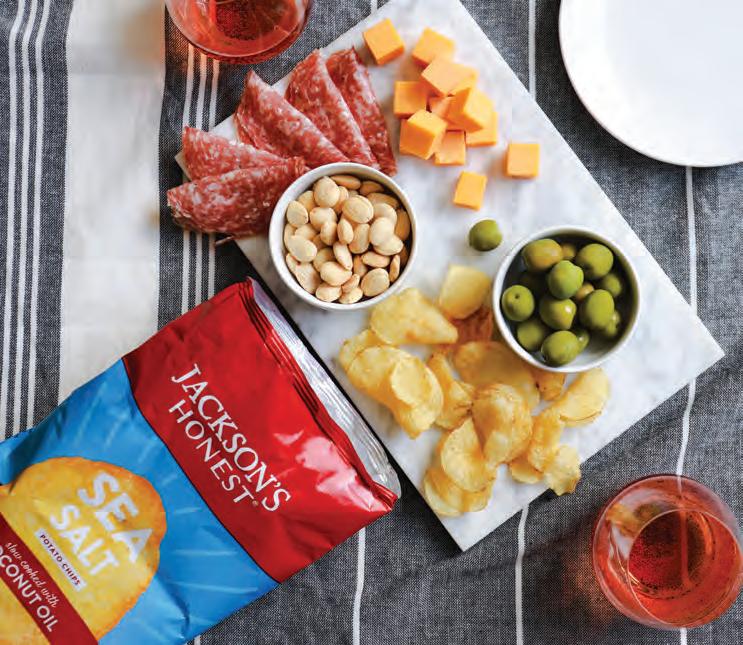
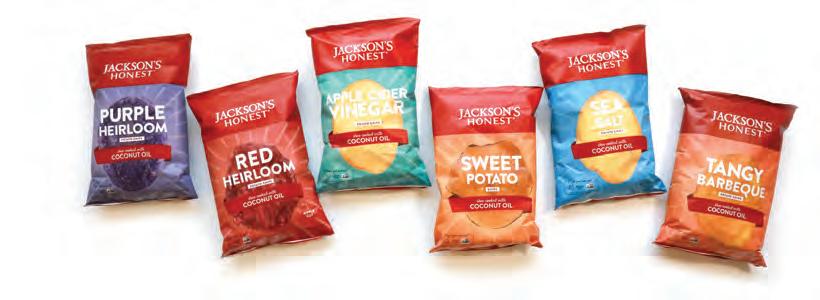
Visit jacksonshonest.com.
The real “awww” factor is the company name, which derives from Bennett’s mom, whom her dad called “Honey Bunchie.” “They’ve actually been calling each other that name my entire life,” laughs Bennett, adding that it worked out well that the family product has honey as a main ingredient.
Honey Bunchies is truly a family business, with Mom, Dad, Kendra and her brother as cofounders and employees, plus others too. Even the packaging design is family-based, Bennett shares. “My dad used a drawing I did of the family when I was 4 years old and turned everyone into bees!” she says. Look for the sweet and salty gluten-free bars, made with eight simple ingredients, at your local King Soopers. More at honeybunchies.com.

It all started on a chairlift in 2009. Perky Jerky founder Brian Levin accidentally spilled a can of Red Bull onto a bag of beef jerky and came up with the idea for caffeinated beef jerky (using guarana, a natural caffeine from Brazilian berries, not Red Bull). Hence the product name.

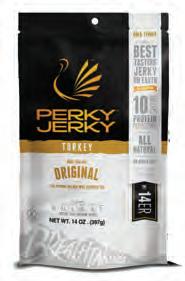
Fast-forward a bit, and Levin decided to ditch the caffeine idea but still focus on producing a healthy jerky option. “If you’re from Colorado, your product better be healthy!” says Zach Greenberg, an original employee and vice president of growth at Perky Jerky.
Today, the Greenwood Village–based company sells its grass-fed, hormone-free beef jerky, as well as all-natural turkey and pork varieties, across the country, including in King Soopers. “We are proud to promote our product as the best-tasting jerky on earth,” says Greenberg, adding that Perky Jerky’s process is to marinate meats overnight and precision-slice them for a more tender bite than other jerky.
Greenberg is also proud of the causes the company supports:, Duchenne muscular dystrophy and Down syndrome research, both of which are near and dear to the founder’s heart. Perky Jerky comes in an array of fun flavors, including Jammin’ Jamaican, Brewmaster’s Pale Ale, and Truffle & Thyme. They’re also launching a new line, made of wagyu beef. Learn more at perkyjerky.com.
Nutritious and umami-rich mushrooms are becoming the new “it” food. BY KARA
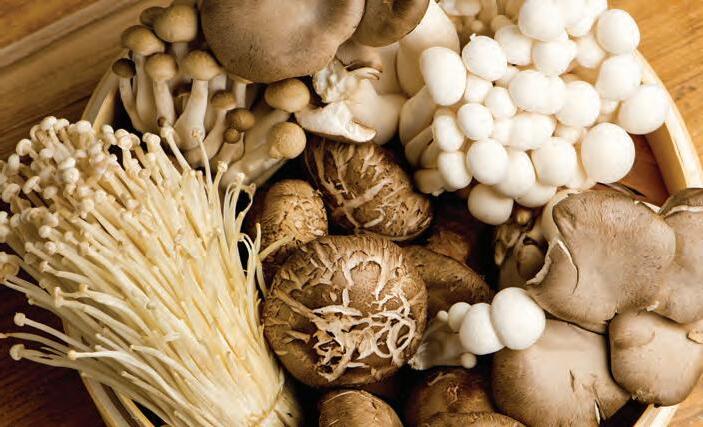
On the trend beat, there is always the hunt for the “next kale” or the next superfood that will explode in popularity and appear in foods far beyond its native habitat. Could the humble mushroom be next? It’s quite possible. Mushrooms are indeed sprouting up in beverages, snacks, bars and meals, adding just the kind of great taste and beneficial nutrients many are seeking.
At a glance, mushrooms have plenty going for them. They are fat-free, low in calories, and contain protein, fiber and nutrients, including vitamin D, potassium, calcium, selenium and riboflavin. But look more closely, and you’ll uncover the medicinal benefits of mushroom varietals like shiitake, reishi, lion’s mane and chaga. These types have long been used to heal and promote wellness in ancient Asian medicine traditions.
NIELSENSuperAdapt Teas, featuring reishi, chaga and cordyceps, paired with spices like ginger and cinnamon.
More familiar mushrooms, like shiitake and portobello, are being transformed into a range of snacks that promote plants or fungi in this case. Toothsome mushroom jerkies deliver a meaty, umami-rich experience, while crispy mushroom chips and airy mushroom “cracklings” offer unique snack options. Bold flavors range from salt and pepper to barbecue to pizza, and can go all the way to black truffle for an elegant turn, especially on a potato chip.
A most inventive application for more everyday mushrooms is using them in ground meat and burgers to replace a portion of meat. Monterey
Umami is one of the five basic tastes (the others are sweet, sour, bitter and salty). It is best described as “savory.” In Japanese, it means “delicious taste.”
Today, medicinal mushrooms in powder form are enhancing foods and beverages that combat stress and inflammation and boost immunity and mental clarity. There are supplements featuring functional mushrooms, but also interesting new foods and drinks. Mushroom coffees and blended beverages are found on wellnessoriented menus and made at home.
Ancient-grain granola maker Purely Elizabeth produces grain-free bars containing tasteless reishi mushroom powder. Reishi are also found in ready-to-drink elixirs from Rebbl. Republic of Tea created a line of
Mushroom’s Let’s Blend Finely Diced Mushrooms come in several flavors to mix seamlessly into burger patties, taco fillings and pasta sauces, reducing fat and cholesterol while upping the plant quotient in a meal.
Plus there are delicious mushrooms easily found in frozen meals beyond pizza. Boomerang’s Spinach & Mushroom Pie is a take on popular Australian hand pies, suitable for vegetarians. Grainful’s Mushroom & Chicken grain bowl uses oats as a base for a unique and hearty twist. And, of course, an ever-widening variety of fresh mushrooms is always available to enhance meals, from morning omelets to lunch salads and dinner kabobs—providing many ways to hop on the mighty mushroom trend wagon.
By 2050, the world population is projected to top 10 billion. According to a new report from the World Economic Forum, an international not-for-profit organization for public-private cooperation, to ensure that this population’s protein needs are met sustainably and nutritiously, food systems will need to transform by integrating more plant-based protein alternatives. The report notes that, particularly in developing countries, meat consumption continues to grow and that this trend is unsustainable because of the land and water required to support farm animals raised for meat, as well as greenhouse-gas emissions (methane) from the animals. Although the report does not call for a complete halt to meat consumption, it demonstrates expanding availability and innovation in alternative proteins and suggests that meat and alternative-protein industries work together to reshape the global food system. Read the full report (Meat: The Future Series–Alternative Proteins) at weforum.org.
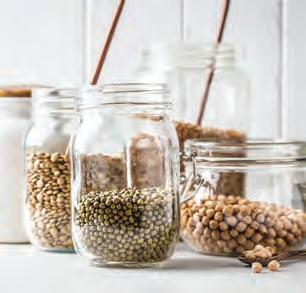

You’ve likely experienced the negative effects of too little sleep: lack of energy, irritability, fuzzy thinking. But you might not have realized that a partial cause of those symptoms may be dehydration. According to a recent Penn State study of 20,000 adults, published in the journal SLEEP, those who slept six hours had significantly more concentrated urine and up to 59 percent higher odds of being dehydrated compared with those who slept regularly for eight hours. Researchers focused on a hormone called vasopressin, which helps regulate the body’s hydration and is released mostly during nighttime sleeping hours. When sleep time is less, the hormone release and, in turn, the body’s hydration are disrupted. The findings suggest this is one reason why you don’t feel good after a night of poor sleep, because dehydration negatively affects your cognition, mood and energy levels. An antidote: On days following poor sleep, drink more water.
Love starchy foods? Try this simple, science-backed nutrition hack: Eat only a little bit of your rice, pasta or potato dish in the first go-round and save the rest for leftovers. Multiple studies, including research published in the Asia Pacific Journal of Clinical Nutrition, have found that heating, cooling and then reheating these foods elevates their resistant-starch content—which has several benefits. Resistant starch is indigestible, meaning that the leftover food may have up to 50 percent fewer calories than the original dish. It can also act as a prebiotic, feeding your good gut bacteria and potentially fighting chronic inflammation. In the aforementioned study, rice that had been cooled for 24 hours and was then reheated also lowered the body’s glycemic response.
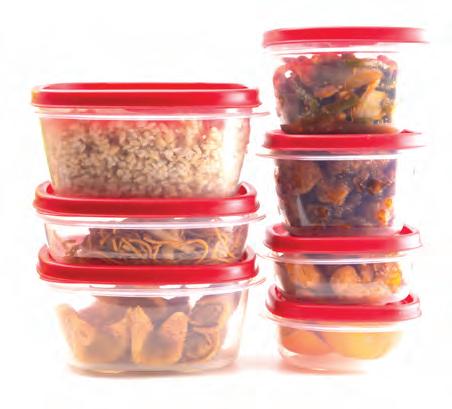

















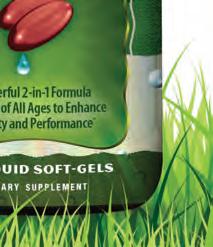











Recharge your body with a spring detox.
BY ROBIN ROENKERAs winter turns to spring, our instinct is to clean—both our homes and our bodies. Liquid-based cleanses are the most common choice—there are endless detox diets based on green vegetable juices, teas, and even lemon water or apple cider vinegar. But it’s important to remember you don’t have to avoid solid foods to reboot your system. You can cleanse simply by being more mindful of what you’re eating—and what you choose not to eat.
“I believe an annual or biannual detox is a really good way to give your body a recharge,” says Cara Jaffee, C.N.T.P., a Colorado-based holistic nutritionist and author of Down to Earth: Find the answers you need to transform your health with real food (2018), a 30-day real-food detox.

Jaffee’s approach centers on eating only organic, all-natural, whole foods free from additives, dyes and preservatives. Her 30day plan avoids all preprocessed, prepackaged foods, as well as sugar, soy, alcohol, grains, starchy vegetables, dairy and gluten.
What’s on the menu? Lots of leafy green vegetables, organic proteins (think grassfed beef or wild-caught fish or seafood), healthy fats (such as nuts, seeds, olive oil and avocados), plenty of water, and a pantry stocked with nourishing spices and herbs, like garlic, turmeric, rosemary and thyme.
Jaffee has used her detox diet successfully
with focus groups, many of whom found it helped with acid reflux and other digestive issues and led to increased energy, weight loss and better sleep, she says.
“It’s meant to be a gentle detox,” she says. “We’re eliminating food groups, but in an approach that’s very sustainable.”
The book offers recipes for dishes like

BE
According to Jaffee, most people will go through some type of withdrawal and may experience food cravings the first three days of a detox. But after 30 days, you will have a better sense of what sustainable health looks and feels like. And you’ll be familiar with a new repertoire of whole-food recipes that you can prepare anytime.
turkey burgers with zucchini noodles or pesto scrambled eggs alongside tips for introducing mindfulness and relaxation techniques—from journaling to yoga—into the 30-day plan, highlighting a holistic mind-body focus.
And while there’s no wrong time to detox, there’s no better time than now.
“Spring is a season of change and growth. We respond to that and feel the call to want to grow and feel better ourselves,” Jaffee says.
1
2
Once you stock up on ingredients, batch-cook some recipes to save time during each week.
Jaffee recommends doing the following each week during a 30-day detox: Make the best use of your time, money and energy by going to the grocery store with a shopping list for a week’s worth of detox-plan recipe ingredients.
Always carry snacks with you. If you work in an office, pack a small cooler of detox-approved foods to have with you throughout the day.
3

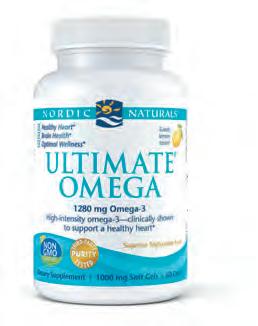

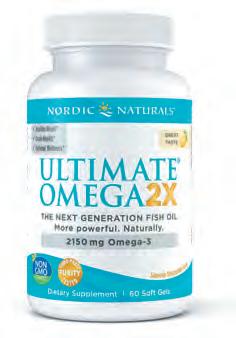
Essential fatty acids (EFAs)—including omega-3s and omega-6s—are polyunsaturated fats that are a critical part of cell membranes and provide a variety of health benefits to help your body function properly. Because EFAs are vital to your health (hence the name “essential”), it’s important that you get enough of them. The catch? Your body can’t produce EFAs on its own—you need to get these good-for-you fats from food or supplements.
Among other functions, fat carries vitamins A, D, E and K through your body, keeps skin healthy, and promotes good vision. Specifically, essential fatty acids benefit your brain, heart and metabolism, playing important roles in processes like inflammation and blood clotting.
Omega-3: These powerhouse EFAs improve heart health, boost brain function, support infant brain development, help with weight management, promote bone density, decrease liver fat and reduce inflammation.
Omega-6: These fatty acids provide energy, enhance bone health, decrease nerve pain, maintain a healthy reproductive system and encourage muscle health.
Omega-3: Look to fatty, cold-water fish such as salmon, sardines, tuna, bluefish, herring, mackerel and black cod. Omega-3 fortified eggs are another option, as well as vegetarian sources like walnuts and flaxseed. But your best bet? Fish and seafood.
Omega-6: Go-to healthy sources include plant-based oils (think safflower, grapeseed, walnut and extra-virgin olive oil), and seeds and nuts like sunflower seeds, pecans and pine nuts.
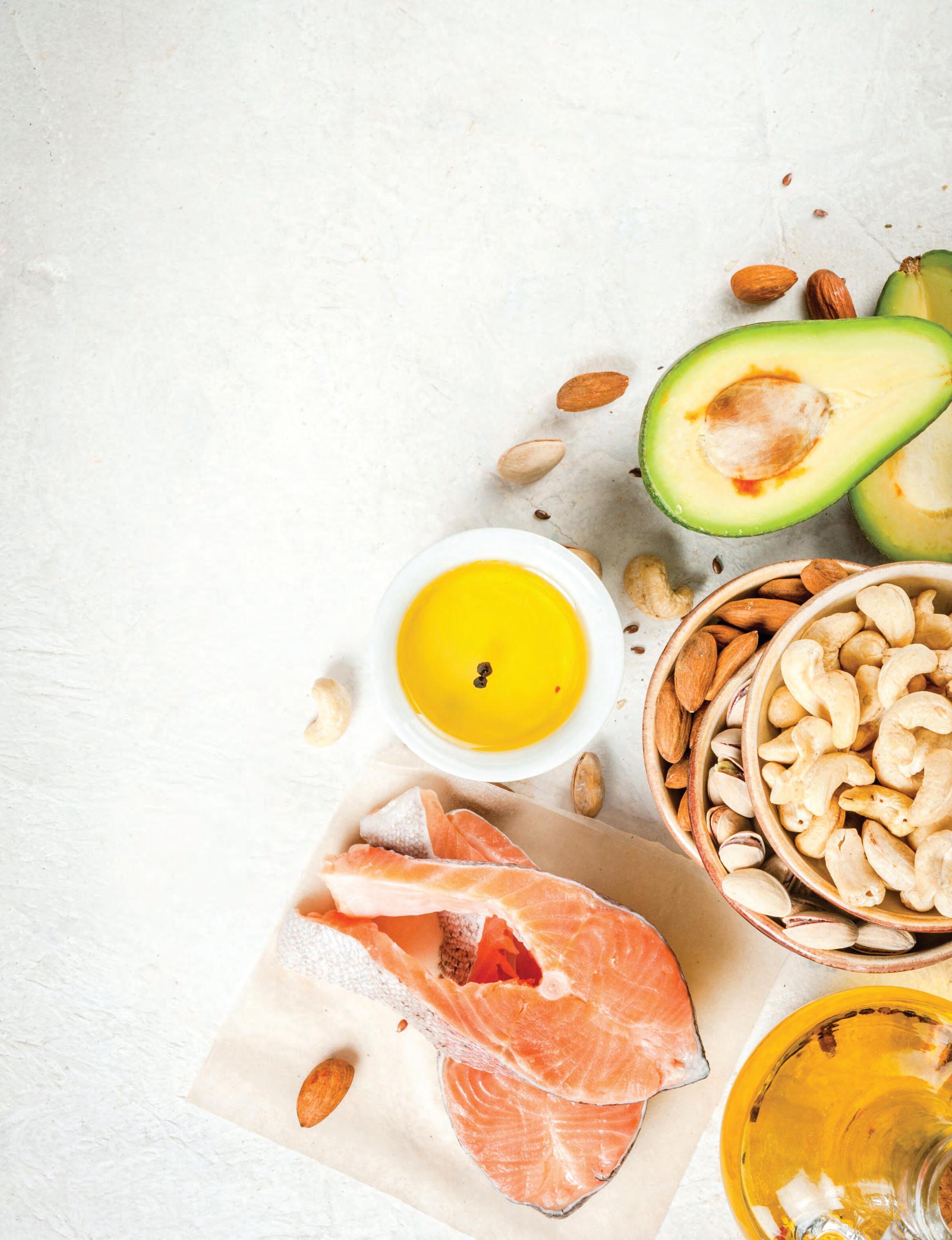
Aim for the right balance of omega-6 and omega-3 fatty acids. In the Western world, most people eat plenty of omega-6s because of oil-based cooking, but not enough omega-3s. Too much omega-6 might contribute to chronic diseases, such as asthma, cancer and obesity. Health experts recommend a dietary ratio of omega-6 to omega-3 fatty acids of 3:1 or less. Research suggests that a high omega-6/ low omega-3 diet increases inflammation, while a diet with a balanced level of these fats decreases inflammation.
There are also omega-9 fats, but these are not “essential” because our bodies can synthesize them from things we eat, and we don’t have to depend on direct dietary sources to obtain them. The main omega-9 is oleic acid, found in olive, canola, peanut and sunflower oils.

From a young age, most of us have known the importance of building and maintaining strong, healthy bones. This is especially top of mind for women as we age into our 40s and beyond. Not that healthy bones aren’t important for men, but osteoporosis is more common in women, especially beyond menopause (largely because of decreasing estrogen levels).
Osteoporosis—which literally means
Intake of these has been positively associated with building new bone and protecting against bone loss. The typical Western diet tends toward an imbalance of consumption of omega-6 fatty acids compared with omega-3s. This is bad for the bones; a recent study showed that individuals who consumed a higher ratio of omega-6 (soybean oil, corn oil, safflower oil, processed foods and snacks) to omega-3 fatty acids tended to have lower bone density than people with a lower ratio of the two fats. Top sources of omega-3s include sardines, wild salmon, herring, walnuts and cod liver oil, as well as chia, hemp and ground flax seeds.
BY DR. DEBRA ROUSE“porous bone”—is a disease in which bones begin to lose their structural integrity over time. In its early stages, physical symptoms can go unnoticed. In later stages, bones start to weaken, bone loss begins to surpass the rate of bone formation, and risk of fractures increases. Ideally, we should think about preventive strategies long before we reach this potentially painful and disabling stage. If
Sufficient vitamin D intake is associated with a lower risk of hip fractures in postmenopausal women with osteoporosis. Sun exposure and foods like fatty fish, cheese and liver are all good sources of vitamin D, but many of us fall short when it
you smoke, are over 50, or have back pain or a chronic illness, consider asking your doctor about bone mineral density testing. A DEXA scan, using low levels of X-ray, is one of the simplest and most reliable ways to measure bone density and check for osteoporosis. In the meantime, here are strategies for building and maintaining strong bones throughout your life.
Current research suggests that just walking may not be enough to protect our bones. Add higher-impact and resistance training, such as jumping, lifting weights, running or wearing a weighted backpack during your walk. The more lean muscle we maintain as we age, the more we protect our bones and keep them strong.
The multitude of micronutrients—including vitamin C, calcium and magnesium–in fruits and vegetables act synergistically to reduce bone turnover, stimulate bone mineralization and prevent calcium loss through the urine. Dark-green and leafy vegetables, such as spinach, kale, chard, broccoli and Brussels sprouts, also contain vitamin K1, which supports bone building. Because vitamin K is fat-soluble, healthy fats aid its absorption—so drizzle olive oil over those greens, or chop up avocado for a side. Certain fruits, including avocados, kiwis and grapes, also provide vitamin K.
The research on calcium supplementation is mixed, so I recommend to include calcium-rich foods in your diet, such as cruciferous and dark-green, leafy vegetables. Fermented dairy products like unsweetened yogurt may be beneficial, and I typically recommend about a ½ cup before bed, when our bodies get busy laying down new bone.
gear for outdoors, fitness and travel enthusiasts.
First celebrated in 1970, Earth Day each April is an annual reminder to be kind to our precious planet and live as sustainably as possible year-round. If you’re active and outdoorsy, with a sense of adventure, we’ve gathered a gaggle of gear that’s made from recycled, reused and sustainable materials to help you be more earth-friendly.
The GoLite ReGreen Windshell is made from about 20 recycled green plastic bottles. The green bottles eliminate the need for dying the fabric, further reducing the ecological footprint by using less energy and water in the production process. $100, golite.com

When you travel—or even when you’re camping—carry your bath accessories in Alchemy Goods’ uber-water-resistant Elliott Dopp Travel Kit, made from reclaimed truck inner tubes…the zipper pull is made from a tire valve, too! $40, alchemygoods.com

The case for these glasses is made from upcycled garments and recycled water bottles.
Sunglasses expert Costa has created the Baffin style with 100 percent–recycled fishing nets to reduce plastic pollution. Every part can be recycled, including the mineral-glass lenses, and nose and temple pads. $199, costadelmar.com

The environmentally friendly—and beautiful—Renew Corc Yoga Mat is made with sustainably harvested cork oak bark from a third-generation farm in Portugal. $139, corcyoga.com

Sportswear and footwear company adidas offers a number of eco-shoes. The Terrex Two Parley trail runner upper is made from Parley for the Oceans’ reclaimed and recycled ocean plastic waste. It’s available in a zero-dye color, a water-saving technique that skips the dying process. $140, adidasoutdoor.com

Learn more about Parley for the Oceans at parley.tv.
Send your used wine-bottle corks to ReCORK (recork.org), a program launched by SOLE, to be used in footbeds, sandals and yoga blocks.


KING SOOPERS EARTH DAY EVENT
EARTH DAY IS APRIL 22. Find savings on a plethora of earth-friendly items at your local King Soopers or City Market and at kingsoopers.com.











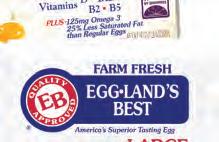









Expert tips for keeping children strong as they power through spring sports and beyond.
 BY KELLEE KATAGI
BY KELLEE KATAGI
As leaves bud and the grass greens up, America’s fields and baseball diamonds come alive as well, with kids once again enjoying outdoor sports. Along with this rise in activity comes a need to make sure they’re adequately fueled.
“The more exercise they do, the more calories they’ll need,” says Wesley Delbridge, R.D.N., a national spokesperson for the Academy of Nutrition and Dietetics and a school nutrition specialist. That doesn’t mean, however, that you should coax them to eat a set amount of food on a rigid schedule. “Let their hunger signals dictate when and how much they eat,” he recommends.
Think beyond three meals a day, and be prepared to provide healthy snacks at any time, Delbridge says, especially at midafternoon before they head to practice or games. If your child’s school doesn’t offer an afternoon snack time, have something ready to go right after school, he suggests. “That way, by the time they start the practice they’re ready to go and not feeling sick because they just ate.”
Every snack—and meal—should have three components: a carbohydrate, a protein and a fat, Delbridge advises. Consuming the three macronutrients together leads to what’s called delayed gastric emptying, meaning the food stays in your stomach longer and goes into your intestines slowly, causing a more gradual rise and fall of blood sugar levels. It also helps to avoid snacks and drinks with a lot of added sugar. Common culprits include yogurt, snack bars, juice boxes and sports drinks, Delbridge says.
Three-Ring Snacks
These smart combinations incorporate carbs, protein and fats.
Rollups made with lean turkey breast wrapped around a cheese stick and greens of choice
Vegetables and hummus
Apple slices with nut butter
Homemade trail mix with nuts, dried fruit, a touch of dark chocolate
Fresh-fruit smoothies with yogurt and ground
flaxseed Pro tip: Add a bit of frozen cauliflower for extra (undetectable!) fiber and nutrients.
Grab-and-go snacks that keep added sugar to a minimum.
Kashi by Kids
A panel of kid influencers helped create tasty Super Food Bites , using nutrientheavy ingredients, such as organic chickpea flour, sweet potatoes and ground flaxseed. Each serving contains 2 grams of protein, so consider eating with yogurt or nuts.

Stonyfield Organic
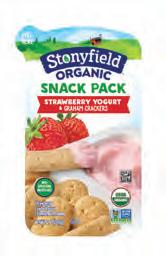
New USDA Organic Snack
Packs are a yogurt dipper with graham crackers and low-fat yogurt, no spoon required. With 3 grams of protein per serving.
thinkKIDS
These tasty protein bars provide 3 grams of fiber, 7 grams of protein from a whey and soy blend, plus 14 grams of carbohydrates for energy.

Kellogg’s • Haygarth
002005 Studio# None
KROGER Live Naturally Kashi Kids
FSI • 1 of 1
KEL002005_mch_FSI_Kroger_LiveNaturally_KashiKids.
indd
Print Code: –
Contact: Jo Jo Winklemann
Studio Artist: DB
Built At: 100% • Print Scale: None
4-Color Process: Cyan, Magenta, Yellow, Black
Placed Images:KEL002005_ahr_FSI_Kroger_LiveNaturally_

KashiKids.tif (CMYK; 300 ppi; 100%)


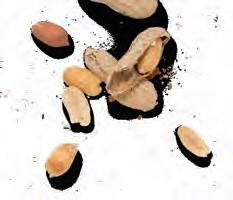
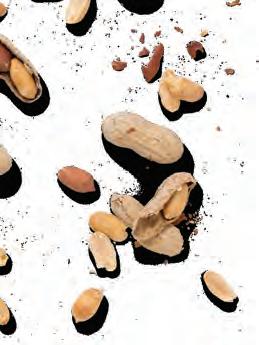
(5.6 oz. or Larger, Any Flavor)
PROTEIN 5–7G SUGAR TASTE!
CONSUMER: Limit ONE coupon per purchase of product indicated. Limit of FOUR like coupons in same shopping trip. Consumer pays sales tax. Coupon may not be bought, reproduced, transferred or sold. No cash value. NO CASH BACK. Void where taxed, restricted or prohibited.
RETAILER: We will redeem this coupon in accordance with our redemption policy, copies available upon request. Cash Value 1/100¢.
Mail Coupons to: KASHI COMPANY 1354, NCH Marketing Services P.O. Box 880001 El Paso, TX 88588-0001 ®, ™, © 2019 Kashi Company 62006860
manufacturer’s couponexpires 7/31/2019
KEL002005_ahr_products.psd (CMYK; 305 ppi; 98.28%)
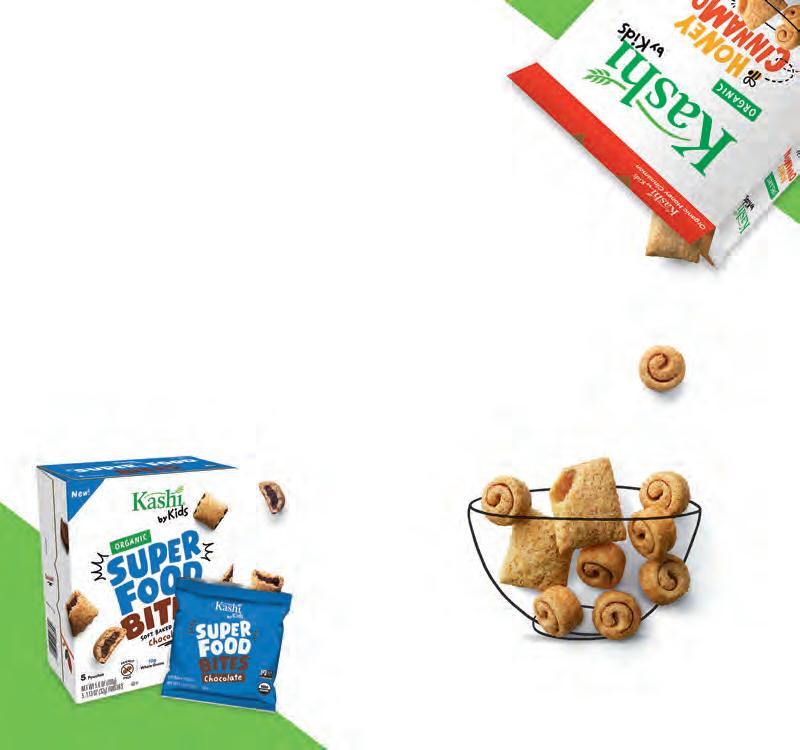



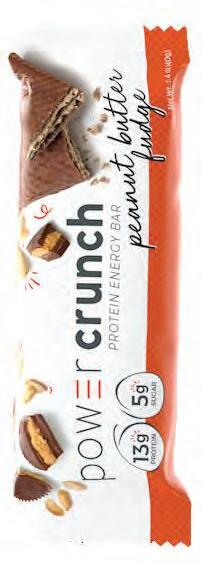



Barcode_KashiKids_032952_LV_NTRLLY-$1_on_1_KASHI_KIDS_RTEC_ OR_BITES_985928.eps (124.5%)
Document Fonts:Myriad Pro (Regular), Gotham (Medium), Benton Sans Condensed (Regular), Berthold Akzidenz Grotesk (Condensed), Benton Sans (Regular, Bold), BentonSans Bold (Regular)
CONSUMER: Redeem only by purchasing the brand and size(s) indicated. May not be reproduced. Void if transferred to any person, firm, or group prior to store redemption. LIMIT ONE COUPON PER PURCHASE.
RETAILER: BioNutritional Research Group will reimburse you the face value of this coupon plus 8 cents handling in accordance with our redemption policy (copy available on request). Consumer must pay any sales tax. Send all redeemed coupons to: BNRG, Mandik & Rhodes, PO Box 490 Dept#1180, Tecate, CA 91980. Cash value: 1/100¢
0644225-017433
PM B1
Reach
BY REBECCA HEATONWe all need protein. Every cell in the human body contains protein, and it is the building block of our bones, muscles, cartilage, skin and blood. The USDA recommends 0.8 grams of good- quality protein per kilogram of body weight daily for both men and women. This averages to 46 grams daily for women, 56 grams for men. Protein bars can help you reach that goal.
“When a daily nutrition plan is deficient in protein, protein bars can be extremely useful to ensure the right amount of protein is consumed,” says sports dietitian Bob Seebohar, R.D.N., owner of eNRG Performance in Colorado. “I always like to take the food-first approach and do everything possible with real food when addressing protein intake, but I realize that we are all busy and sometimes it is not possible to have real food at each meal or snack time. That said, I would definitely choose more of the ‘natural’ protein bar options instead of the highly processed, sugar-laden ones.” Read on for some healthier, natural bar choices.
PROTEIN BAR.
Chocolate Peanut Butter
Bar size: 2.12 ounces | 20 g protein 210 calories | 1 g sugar
What’s inside: Protein blend of milk and whey protein isolates. Plus, peanuts, soluble corn fiber and unsweetened chocolate. Sweetened with stevia and erythritol.

Our tasters say: “Very dense. If you like bitter chocolate, this is a good choice.”
Bonus points for: Only 1 g sugar
PROTEIN ENERGY BAR
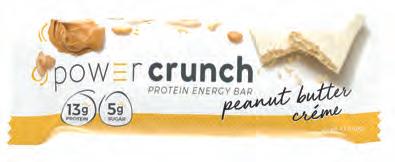
Peanut Butter Créme
Bar size: 1.4 ounces | 13 g protein 200 calories | 5 g sugar

What’s inside: A proprietary hydrolyzed whey and milk protein blend for easier digestion. Creamy peanut butter filling, lightly sweetened with sugar, fructose and stevia.
Our tasters say: “Really like the cream-filled wafer texture; not too dense or heavy. Tastes great.”
Bonus points for: Only 5 g sugar
BAR.
Chocolate Almond Crunch
Bar size: 1.76 ounces | 10 g protein 200 calories | 5 g sugar
What’s inside: Whey protein isolate is the bulk of the protein. Also contains omega-3-laden milled chia seeds, cinnamon, vanilla, rosemary flavors and a bonus 1 billion CFUs of Bacillus coagulans (probiotics).
Our tasters say: “Not overly sweet; easy to eat. Creamy texture with crunchy cacao nibs. Like the added probiotics.”
Bonus points for: Gluten-free, kosher, non-GMO, only 5 g sugar
Some of us just want our protein straight from meat. Dried jerky has been the go-to for ages. But all-natural meat bars have become a mainstay option, minus the jaw-muscle-testing texture of most jerky. Brands like Epic, Country Archer and Krave combine grass-fed and humanely raised or sourced meat, poultry and fish with spices, veggies and fruits for flavors like Epic’s Chicken Sriracha, Krave’s Wild Blueberry Beef and Country Archer’s Herb Citrus Turkey. Bars typically have around 10–15 grams of protein and fewer than 200 calories, depending on the protein source.
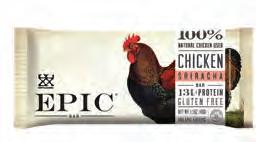
your daily nutrient goals—and satisfy your snack cravings—with these power-packed protein bars.
THE COMPLETE COOKIE.

Snickerdoodle
Bar size: 4 ounces | 16 g protein 400 calories | 22 g sugar

What’s inside: Enriched wheat flour and a protein blend of wheat gluten, pea and rice proteins. With molasses, cinnamon and other natural flavors.
Our tasters say: “Rich, soft and dense. An energy version of a cookie.”
Bonus points for: Vegan, kosher, non-GMO
PLANT-BASED HIGH PROTEIN BAR

Sea Salt Almond Chocolate
Bar size: 1.94 ounces | 13 g protein
230 calories | 5 g sugar
What’s inside: A plant-based protein blend of pea, pumpkin and brown rice proteins. Plus, roasted almonds and pea-protein crisps. Sweetened with stevia.
Our tasters say: “Appreciate a plant-based protein bar option. Like the chocolate coating and little crisps.”
Bonus points for: Vegan, gluten-free, kosher, only 5 g sugar
NUT BUTTER FILLED. SNACK BARS. Honey Almond Butter

Bar size: 1.3 ounces | 4 g protein 170 calories | 8 g sugar
What’s inside: Almond butter leads the ingredient list for protein, followed by 100 percent whole grains (oats, quinoa, sorghum), cane sugar, honey, almonds and spices. Our tasters say: “Really like the flavor and texture; just the right-sized bar for a snack or workout.”
Bonus points for: Gluten-free, kosher
MACRO BAR.
EVERLASTING JOY
Coconut + Almond Butter + Chocolate Chips
Bar size: 2.3 ounces | 10 g protein
270 calories | 12 g sugar
What’s inside: Almond butter, sprouted brown rice and pea protein comprise the protein in this bar. Sweetened with brown rice syrup and coconut sugar, plus Fair Trade chocolate chips.
Our tasters say: “Really like the flavor. Reminds us of the classic Almond Joy bar, but much healthier.”
Bonus points for: USDA Organic, vegan, gluten-free, soy-free, non-GMO, kosher
When is the best time to eat a protein bar when exercising? “It will depend on the type of workout, the goal of the individual, their age and, to some degree, gender,” says sports dietitian Bob Seebohar. “Generally speaking, we like to see a proteinand-carbohydratecombined source both before and after strength training and perhaps before and after endurance-based training. However, it is much more important for strength, because we are trying to have a positive effect on the net proteinsynthesis rate, which is affected more by strength versus endurance exercise.” As for during a workout, Seebohar says that before and after exercise is a much more important time frame for most people, depending on their goals.
Four plant-based powders with a protein punch. BY
REBECCA HEATONIf you need an easy way to get more protein in your diet, consider a powder. It’s as simple as adding a scoop or two to a glass of water or your favorite dairy or nondairy milk. Powders provide a protein boost to smoothies, too. Particularly if you are vegetarian, here are four natural, plant-based options to try.
1 scoop (28 g)
120 calories
21 g protein
110 calories
22 g protein
1 scoop (27 g)
100 calories 16 g protein
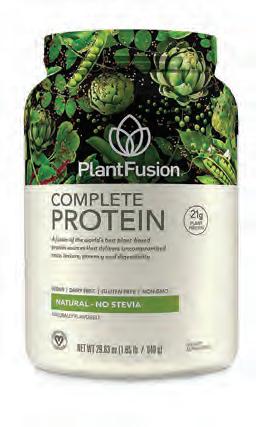
The team at PlantFusion is proud of its all-natural, plant-based powders and travels the world to source ingredients. Their Complete Protein is a blend of allergen-free and nutrientrich ingredients, including pea protein, artichoke powder, sprouted amaranth and quinoa powders, algae and tapioca, plus proprietary enzymes for easier digestion and amino acids to build and repair muscle.
Vegan, gluten-free, dairy-free, non-GMO

You’ll feel good reading this powder’s ingredient list: organic pea protein, plus 13 organic sprouted grains, seeds and legumes— including sprouted brown rice, amaranth, buckwheat, millet, quinoa, chia seeds, garbanzo beans, lentils and adzuki beans—and flax, sunflower, pumpkin and sesame seeds. An added bonus: an enzyme and probiotics blend with 3 billion CFUs to aid digestion. Sweetened with a touch of stevia and erythritol.
Certified B Corporation, USDA Organic, vegan, gluten-free, dairy-free, non-GMO, kosher

Pea protein is the first ingredient in this plantbased powder, followed by brown-rice protein, protein-laden sacha inchi powder (a superseed from the rainforest) and a bonus twist of greens, including spinach, kale, alfalfa grass and broccoli. Enzymes in papain powder (extracted from raw papaya) help digestion, and a bit of stevia adds a sweet taste.
Gluten-free, soy-free, non-GMO
Healthy Skoop PlantPowered Daily Protein –Chocolate
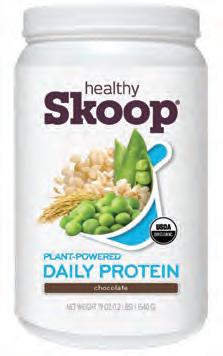
Launched by Dr. James Rouse, a naturopathic physician and wellness and nutrition expert, and Greg Stroh, cofounder of IZZE natural soda, to make getting plant-based nutrition simple, Healthy Skoop is an organic plantbased protein blend with a simple ingredient list of pea and brown-rice proteins, cocoa, coconut sugar, vanilla and chocolate flavors, and a touch of stevia.
USDA Organic, soy-free, gluten-free, dairy-free, non-GMO





You’d think that buying eggs would be easy. But with all the confusing terms and misleading information, navigating the egg aisle can be overwhelming. Here’s a guide to making the smartest choice when it comes to eggs.
 BY REBECCA TREON
BY REBECCA TREON
Eggs have been controversial in recent decades, with trends leaning toward avoiding consumption altogether or eating only the egg whites. “Eggs are part of a balanced diet,” says Janelle de Buzna, R.D.N., of Scottsdale, Ariz. “The vitamins and nutrients in eggs are important for your health, from gut health to brain function.”
SOME GOOD NEWS ABOUT EGGS:
Ninety percent of U.S. adults, pregnant women and children are lacking in this essential nutrient, which supports cell structure and nervous system function. One large egg contains 147 mg. Daily recommended adequate intake is 425 mg for women, 450 mg for pregnant women and 550 mg for men.
Eggs contain an adequate proportion of each of the nine essential amino acids necessary in the human diet. Other complete proteins include red meat, poultry, fish, cheese, soy and quinoa.
Studies show that cholesterol in eggs has almost no effect on your blood cholesterol levels, which are more influenced by any saturated and trans fats you consume. “HDL reduces inflammation and keeps everything moving in the bloodstream. LDL is important because it delivers important nutrients to each cell,” says de Buzna. “LDL often gets a bad rap, but the body still needs it in moderation. In eggs, the LDL is in the yolk—but so are the nutrients—egg whites house most of the protein.”
In several clinical trials with men and women consuming either eggs or a bagel for breakfast, participants reported less hunger, more satiety, lowered body mass index, weight loss and higher energy levels from eating eggs.
DID
If you can’t tell which eggs in the fridge are hard-boiled, try spinning them. Raw eggs wobble as the liquid inside shifts, but hard-boiled eggs will spin smoothly.
With so many options—how can we know what we’re buying and why? Over the past 60 years, eggs have come a long way from fresh ones raised on a nearby farm to those from countless industrial, factory-farm operations. Egg-carton vocabulary has evolved and expanded too, so here we offer a breakdown of what the array of terms mean.


The least-expensive choice, these eggs don’t mention farming practices on their labels. And there’s a reason why. Typically, four hens share a 1-square-foot battery cage in barns housing thousands of birds with no ability to roam. Cramped living conditions encourage injury and infection; hens may be given antibiotics to increase production. Molting (or shedding feathers, which causes a new production cycle) can be forced by withholding food or water. Feed is unregulated and is often supplemented with animal by-products.
Hens are fed a diet that is USDA Certified Organic, meaning it’s free of toxic synthetic pesticides, antibiotics and GMOs. Molting must occur naturally, but the organic standards do not include many welfare provisions.
Chickens raised in a cage-free environment are not confined to cages, but are still housed in barns (they are required to have 1 square foot of space each) with thousands of birds and often have little to no exposure to sunlight. They may eat the same feed as conventional hens and may be given antibiotics, or they may be given healthier feed depending on the farm.
Most small family farms, such as Pete and Gerry’s Organic Eggs in New Hampshire, ensure that hens have space to roam outdoors. “We believe that all hens should be raised in a way that allows them to engage in the behaviors that come naturally to them, such as foraging in the grass, scratching around in the dirt, and enjoying fresh air and sunshine,” says Jesse Laflamme, CEO of Pete and Gerry’s. Space standards are the same as cage-free, but free-range are guaranteed access to the outdoors, even if that means a fenced-in concrete slab—a loophole that larger operations often abuse. Free-range hen feed cannot contain antibiotics.


These birds are living a bucolic life. With flocks of only a few thousand and access to more than 108 square feet per
bird, hens are given several acres to roam, scratch, dust-bathe and do chicken-y things. Pastures are rotated as needed and regrow naturally. Because hens are not confined or stressed, they produce an egg that’s superior in flavor and nutrition. “This is really what egg farming used to be like 100 years ago,” says Dan Brooks, director of brand design and communications at Vital Farms, which sells organic and pasture-raised eggs. “And it’s what it should look like today.”
This label isn’t managed by the government, but rather a nonprofit that uses consumers’ good conscience to drive more-humane farming practices. “Certified Humane is the most highly respected third-party animal welfare standard in the world, with rigorous annual audits and unannounced inspections of farms. So, when a consumer sees the Certified Humane seal, they can rest assured that the hens have the highest quality of life possible,” says Laflamme.
NUTRIENT ENHANCED
Hens are fed a nutritionally enhanced vegetarian feed. “At Eggland’s Best, we know that consumers are looking for fresh, nutritious, better-tasting eggs, so it’s important that our hens are eating a nutritious diet,” says David Holdsworth, vice president of marketing at Eggland’s Best vegetarian-fed eggs. “We feed them a proprietary high-nutrition formula of good grains like rice bran and alfalfa, plus canola oil, sea kelp and vitamin E, without any recycled or processed ingredients, or hormones or antibiotics.”
SOME BRANDS TO LOOK FOR IN THE EGG AISLE:

EGGLAND’S BEST
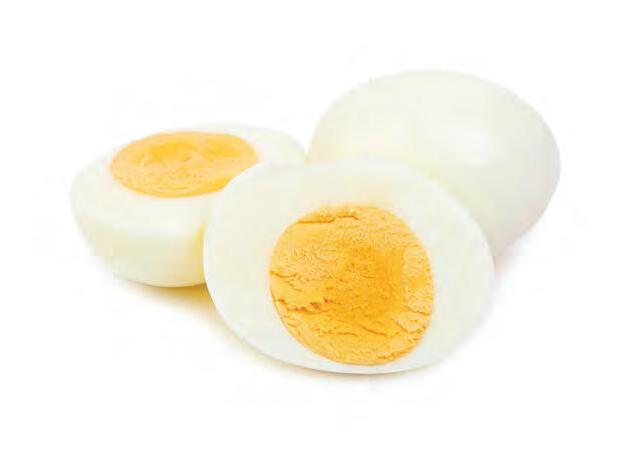
ORGANIC VALLEY
LARGE
70 CALORIES | 5 GRAMS FAT
6 GRAMS PROTEIN
Plus varying amounts of 13 vitamins and minerals, including choline, calcium, magnesium, potassium, phosphorus, iron, vitamin B12 and vitamin D
Expert tips on how to make your culinary domain sparkle—without all the chemicals.
BY REBECCA HEATONRebecca Sullivan, author of The Art of Natural Cleaning (Kyle, 2018), is on a mission to live more healthfully and naturally, like her grandmother did. “All of my interests in doing and writing about things that are better for our health and the environment stem from how my grandmother and her generation lived: simply. I call them ‘granny skills,’” says Sullivan.

When it comes to housecleaning, in particular the kitchen, Sullivan is all about doing things without chemical-laden products. “My nan cleaned with vinegar and lemon,” she says, adding that if you care about putting healthy food in your body, it’s only natural you would care about what you use to clean your house.
In the spirit of spring cleaning, Sullivan shares the following “‘granny skills’” for freshening up these troublesome parts of your kitchen.
“These can harbor an immense amount of bacteria,” says Sullivan. To clean, use salt, lemon and sunshine. “Once a week, sprinkle with coarse salt, squeeze on some lemon juice, and rub with a scouring pad. Rinse with hot water, and leave outside in the sunshine, which gives a cleaning and bleaching boost.”
Use leftover coffee grounds. “Coffee grounds are an amazing odor absorbent,” says Sullivan. Simply put some in a dish, uncovered, and stick on a shelf in the back of your fridge. Change out every week or so. “The grounds are great for smelly rooms, too,” she adds.
SULLIVAN RECOMMENDS ALWAYS HAVING A SPRAY BOTTLE OF WHITE VINEGAR HANDY FOR CLEANING.

To clean oven or pot/pan grime, sprinkle with baking soda, and then coarse salt, followed by several squirts of white vinegar. Let it sit overnight, and then wipe with a soft sponge or cloth. “The salt is an exfoliate and will act as a scouring pad,” Sullivan says.
Not fond of vinegar smell? Make your own all-around cleaner with orange peels and alcohol (such as grain alcohol or vodka). Fill a jar close to full with alcohol, and top off with citrus peels. “Orange is best, but you can also add lemon peels,” says Sullivan. Let it sit for at least one month, and then strain into a spray bottle. “I use this cleaner for any surface: all of my kitchen counters and benches, the sink, also the bathroom.” If you don’t mind vinegar, this recipe works with vinegar and citrus peels, too. “I also like to add essential antibacterial oils such as tea tree, eucalyptus or lavender,” says Sullivan.
“I hate using mothballs,” says Sullivan. To prevent pantry moths from infesting your dried foodstuffs, try Sullivan’s easy recipe. “I take little cotton balls; moisten them with a few drops each of basil, lavender and peppermint essential oils; and then put them in my pantry and utensil drawer.”
VISIT LIVENATURALLYMAGAZINE.COM FOR SULLIVAN’S HOMEMADE ANTIBACTERIAL WIPES “RECIPE.”
Healthy cooking just got easier with these tips from Colorado chef Bradford Heap.
 BY KELLEE KATAGI
BY KELLEE KATAGI
A commitment to cooking at home can be hard. And a commitment to doing so healthily and sustainably is even harder—but totally worth it, says Boulder chef Bradford Heap, whose own experience is a testament to the power of eating well. A few years ago, arthritis-related pain inspired him to do some nutrition research, and his findings nudged him toward a more plant-based diet.
“I feel so much better since I started eating like this,” Heap says, while taking time out from his New Zealand vacation to talk to Live Naturally. “I can run four miles now, and I could never run before. I’m 57, and I’m about to go hop on a surfboard. I don’t want to go into my old age with a whimper. I want to go with a big brawl and a couple of right hooks.”
Heap’s culinary journey has followed a similar trajectory, from classical training at the Culinary Institute of America to learning from top chefs in France to now running two Boulder restaurants—Wild Standard and SALT—known for their fresh, healthy and eco-friendly ingredients. Here, Heap offers tips to help you cook nutritiously and sustainably over the long haul.
“You can really do a lot for yourself and the planet by going vegetablecentric, where you bring the vegetable to the center of the plate and use animal protein more as a garnish. My new secret ingredients for veggies are North African and Middle Eastern spices—ras el hanout, za’atar, vadouvan. They enliven and awaken the vegetable. Stock your pantry with them, and play around. Don’t be afraid to make mistakes.”
“Especially wild Alaskan salmon. The thing about sockeye is that it’s a very short season, and it’s super-abundant and super-healthy, so they tend to catch it and then process and freeze it right away. The salmon that lays around on the deck and then three weeks later gets to your table, that’s not fresher than salmon that was frozen. Also try oysters and mussels— they’re super-sustainable and really easy to cook.”

“Getting everything set up will make you a much more successful cook. This includes making a weekly plan and going to the market once to buy what you need for that week. That will get you excited for you what you want to try out. Also, in the case of garlic, prepping it beforehand makes it more nutritious. Smashing garlic 10 minutes before you cook it allows it to create the cancer-fighting compound allicin.”
“This is super key, because cooking is hard, and it makes it so much harder if you eat and then you have this big pile of dishes. Who wants to do that? Nobody. So you just have to take responsibility to clean as you go. This one small thing can keep you from avoiding cooking.”
For delicious recipes from Bradford Heap, including his special chickpea hummus, visit livenaturallymagazine.com.


This refreshing fuzzy fruit does wonders for your health and your palate.
BY KELLEE KATAGIKiwifruit’s bright-green flesh is reminiscent of the green of spring—which is fitting, because this nutritious fruit (actually, berry) is fresh and in season from November to May. Read on to discover why, when and how to buy, store and enjoy delicious kiwis.
The most obvious reason: flavor. Kiwis are at once tart and sweet, juicy and refreshing (see below for ideas on how to eat them). Beyond taste, kiwis are little nutrient powerhouses. The two headliners are vitamin C—one medium kiwi delivers 117 percent of your daily needs— and vitamin K (38 percent in a medium kiwi), which helps with bone building and blood clotting, among other things. Kiwis also contain 9 percent of your daily fiber requirement, as well as lutein and zeaxanthin (for eye health), potassium and copper. Kiwis consistently appear on the Environmental Working Group’s Clean 15 list of the produce harboring the fewest pesticides.
Around the world, some kiwi varieties have smooth skin, but most sold in the U.S. are fuzzy. Avoid fruit that are wrinkly or bruised. Test for ripeness by gently squeezing the fruit between your thumb and forefinger. If it yields a bit, it’s ripe, which means sweeter and juicier; the firmer the fruit, the more tart it will be.
Kiwis were introduced in the U.S. in the 1960s.
Firm, uncut kiwis can be stored at room temperature for a few days to a week, or up to two to four weeks in the fridge. Ripe kiwis will last a few days on the counter or a few days to a week in the fridge.
The California Kiwifruit Commission recommends slooping, a combination of slicing and scooping: Gently wash the outside of the kiwi, slice it in half, and scoop out the insides with a spoon. TIP This method makes kiwis a good on-the-go snack.
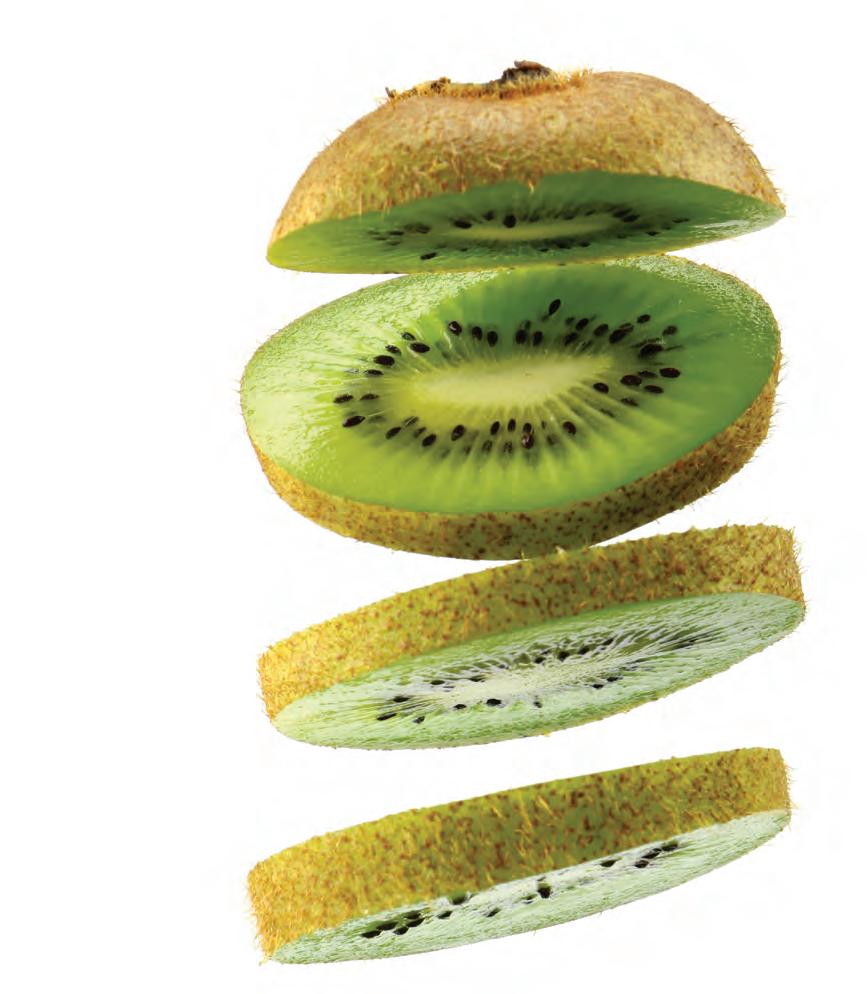

Other options include peeling and slicing, or slicing with the peel on and eating the whole thing. With any method, gently wash the outside first, which will remove a lot of the fuzz.
Kiwis are an excellent fruit salad addition, but cut and mix in only as much as you’ll eat in one sitting; it will get too mushy if it sits for very long. You can also serve them on fruit pizza; in smoothies, lemonade or cocktails; atop salads or desserts (add just before serving); in fresh salsa or chutney; and more.
Possible science-backed benefits of kiwi consumption include better digestive function, reduced asthma symptoms, improved sleep volume and quality, increased heart health and higher antioxidant activity.
Kiwis derive their name from the fuzzy, brown New Zealand bird of the same name.
A bevy of new cookbooks to keep you nourished through the season.
Aging: It’s an eternal battle. But there are ways to minimize its effects through diet. In their new book, The Ultimate Age-Defying Plan (Da Capo Lifelong, 2019), award-winning vegan chef Mark Reinfeld and naturopathic doctor Ashley Boudet explain how a plant-based diet and daily self-care rituals can boost your health and vitality as you age. “It is putting Hippocrates’s edict to ‘let food be thy medicine,’” they write. The book includes 175 vegan recipes with seven ingredients or fewer, including Portobello Cheez Steak Stuffed Peppers, Quinoa Quiche and Raw Choco-Cherry Bombs. Get a free download of Reinfeld and Boudet’s NOURISH plan for optimal health at doctorandchef.com.
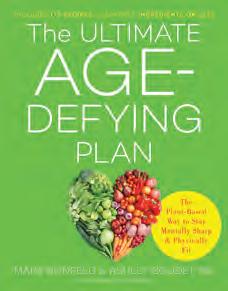
When her husband was diagnosed with gout, Brandi Doming launched her popular blog The Vegan 8, with vegan recipes using eight ingredients or fewer. The diet switch was life-changing for her husband—and for Doming and their daughter, too. In her new cookbook of the same name (Oxmoor House, 2018), Doming shares 100 simple, delicious recipes to prove that anyone can adopt a vegan diet without sacrificing taste everything from sweet to savory, like Healthy Apple Pie Cookies, Lazy Red Lentil Salsa Soup and Fool ’Em Cream Cheese SpinachArtichoke Dip.

“Beauty is about nourishing your body from the inside out,” says chef and health coach Mafalda Pinto Leite in her new book Radiant: The Cookbook (Roost, 2018). Pinto Leite has created more than 90 vegan and mostly raw recipes, including Chickpea Pancakes, Green Goddess Noodles and Acai Beauty Bars, using nutrient-dense ingredients from adaptogenic herbs and algae to sweet potatoes and turmeric. The goal: to inspire you to fall in love with real foods and see the difference they make to your skin and overall well-being.
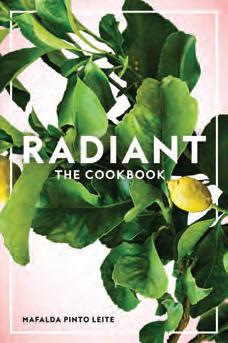
Each year, more than 50,000 people visit the Kripalu Center for Yoga & Health in Massachusetts to practice yoga and enjoy the famously delicious and healing food. In The Kripalu Kitchen (Random House, 2019), Jeremy Rock Smith, executive chef at the center, has compiled 125 nourishing, easy-tomake recipes that work for a variety of diets: vegan, vegetarian, raw, glutenfree, dairy-free, sugar-free and more. Garden Pea, Leek and Potato Cakes; Creamy Polenta and Vegan Mushroom Cream Sauce; and the legendary Kripalu Chai are just a few of the many flavorful options.
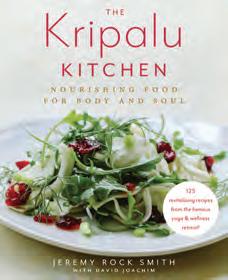

Cold brew is the thing (see “Some Like It Cold” on page 32 to find out why). The Bean Envy Cold Brew Coffee Maker makes it easy to tap into this trend, without shelling out $4 per cup at a coffee shop. Simply place coarse grounds in the stainless-steel filter, slowly pour water into the shock-resistant glass carafe, steep in the fridge or at room temperature for 12 to 24 hours (a nonslip silicone base keeps it in place) and serve straight from the pitcher. And it’s easy to clean when you’re done. $29.95

Upgrade your kitchenware with these latest gadgets.
Leave it to the Swiss to design a beautiful, modern way to store and showcase your best kitchen knives. The Vision Knife Block from Kuhn Rikon is made from clear plastic to keep blades and scissors visible—no more guessing which knife to select. A flexible inlay along the top allows any size and combination of knives and won’t dull blades like wooden knife blocks do. Best of all: It just looks cool. $40

In our book, a food grater is an essential kitchen tool. The Tower Grater from Chef’n features three handy, removable grating surfaces—fine/zest, coarse and shaved—to tackle any array of cheeses, vegetables, citrus, ginger and more. Keep the grate plates on to catch food and avoid a mess. Or easily remove to grate directly over food while you’re cooking or when serving. A nonslip base keeps the grater steady when in use. Dishwasher-safe, too. $39.99

Americans are drinking nearly 170 million gallons of sparkling water each year. Are you one of them? SodaStream’s new Fizzi One Touch sparkling-water maker gives you fizzy water at the touch of a button, with three levels of automatic carbonation to suit your bubble preference. Simply fill up the bottle with tap water, attach to the machine, press a button and voilà: bubble water. There are even naturally flavored Fruit Drops ($4.99 for 1.36 ounces) for custom flavors. $129.99
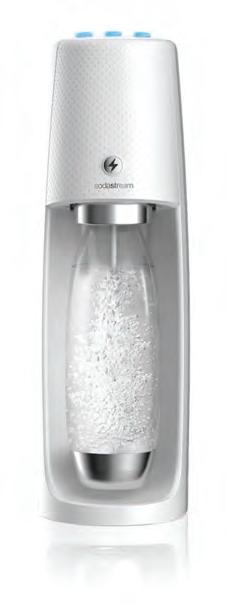
Keep your grocery bags from sliding around and spilling in your car trunk with a CleverMade SnapBasket TrunkCaddy. This softsided, sturdy organizer holds up to 12 gallons—a large grocery bag, plus more—and has built-in handles, making it easy to carry from the car into the store or house. Velcro strips on the bottom keep it secure in your trunk. There’s also Velcro on the sides to connect multiple carriers. When not in use, just fold down flat. Two-pack for $34.99

















Cold brew—which burst on to the American coffee scene a few years back and continues to grow in popularity—may sound like a synonym for “iced coffee,” but the two are quite distinct. And it all comes down to chemistry.
“Really good coffee has natural sugars that develop during the roasting process, and the cold-brew method helps extract all of that really good sweetness from the coffee,” says Lisette Gaviña Lopez, marketing director for California-based Don Francicso’s Coffee. “It’s so drinkable and refreshing.”

Iced coffee is simply traditionally brewed coffee that has been refrigerated or cooled with ice cubes. For cold brew, however, the grounds steep in cold or room-temperature water for a full day, creating a concentrated beverage that is lower in acidity than regular coffee. “With regular brews, the heat extracts more acids from the coffee,” Gaviña Lopez explains. Lower acidity leads to a sweeter taste, which means you can often skip adding sugar to cold brews.
The cold-brewing process also uses less water, which makes for a more-concentrated final product that has higher caffeine levels and a thicker mouthfeel. “It’s really strong, which means you can do a lot with it,” Gaviña Lopez says. Read on for a roundup of some of our favorite store-bought varieties.

Un-Sweet Black
This tasty, straight-up brew uses Arabica-based beans from Utz Certified (read: sustainable) farmers.
High Brew Coffee Cold Brew

Double Espresso
Get your sweet fix anywhere, with only 6 grams of sugar in this 8-ounce can.
Cold brew makes an ideal base for protein shakes, sodas, cocktails and more. Or, for flavored cold brew, infuse it during the steeping process with extracts, spices, fruits or herbs. Get creative, or visit livenaturallymagazine.com for delicious recipes from Don Francisco’s Coffee.
Enjoy this rich, chocolatey brew straight out of the glass bottle or pour over ice.

Kohana Organic Cold Brew Coffee Concentrate Original

USDA Certified Organic, 100% Arabica beans make for a pure, hearty brew—16 servings in a 32-ounce bottle.
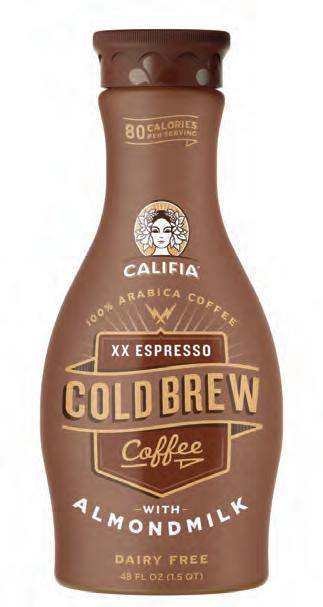
Six servings of dairy-free goodness fill this 48-ounce bottle of direct-trade (a.k.a. farmer-friendly) coffee.

Buy this robust, 100% Arabica coffee, and part of the proceeds will benefit fair-trade Colombian coffee farmers.



MAKING YOUR OWN COLD BREW IS AKIN to cooking in a slow cooker—it takes a long time (12–24 hours), but the process is simple, especially with the right equipment. Here’s how:
1 Use a coarse-ground coffee. Fine grounds may end up in your final product. If possible, use either a French press or a coldbrew-specific coffee maker (check out Bean Envy’s variety on page 30). You can also use a mason jar or other glass container with a tight lid, but the process will be messier. Avoid plastic, which can leach chemicals into the coffee.
2 Steep the grounds directly in water, using about half the amount of water as you would for regular coffee. For example, the ratio for a French press is usually 1 part coffee to 8 parts water; for cold brew, the ratio becomes 1 to 4 (or 8 tablespoons of grounds per 32 ounces of water). Let sit at room temperature (about 70 degrees or cooler) or in the refrigerator for 12–16 hours for a lighter brew, and up to 24 hours for stronger coffee.
3 After coffee is steeped, press down the French press plunger, or remove the filter from the cold-brew pitcher, or pour the coffee through a paper or mesh filter if you’re using a jar (this may be messy).
The result: a cold-brew concentrate that can be diluted with water or ice or used as a base in other beverages.



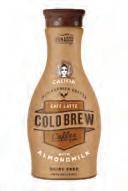
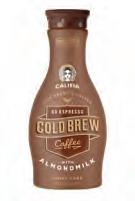

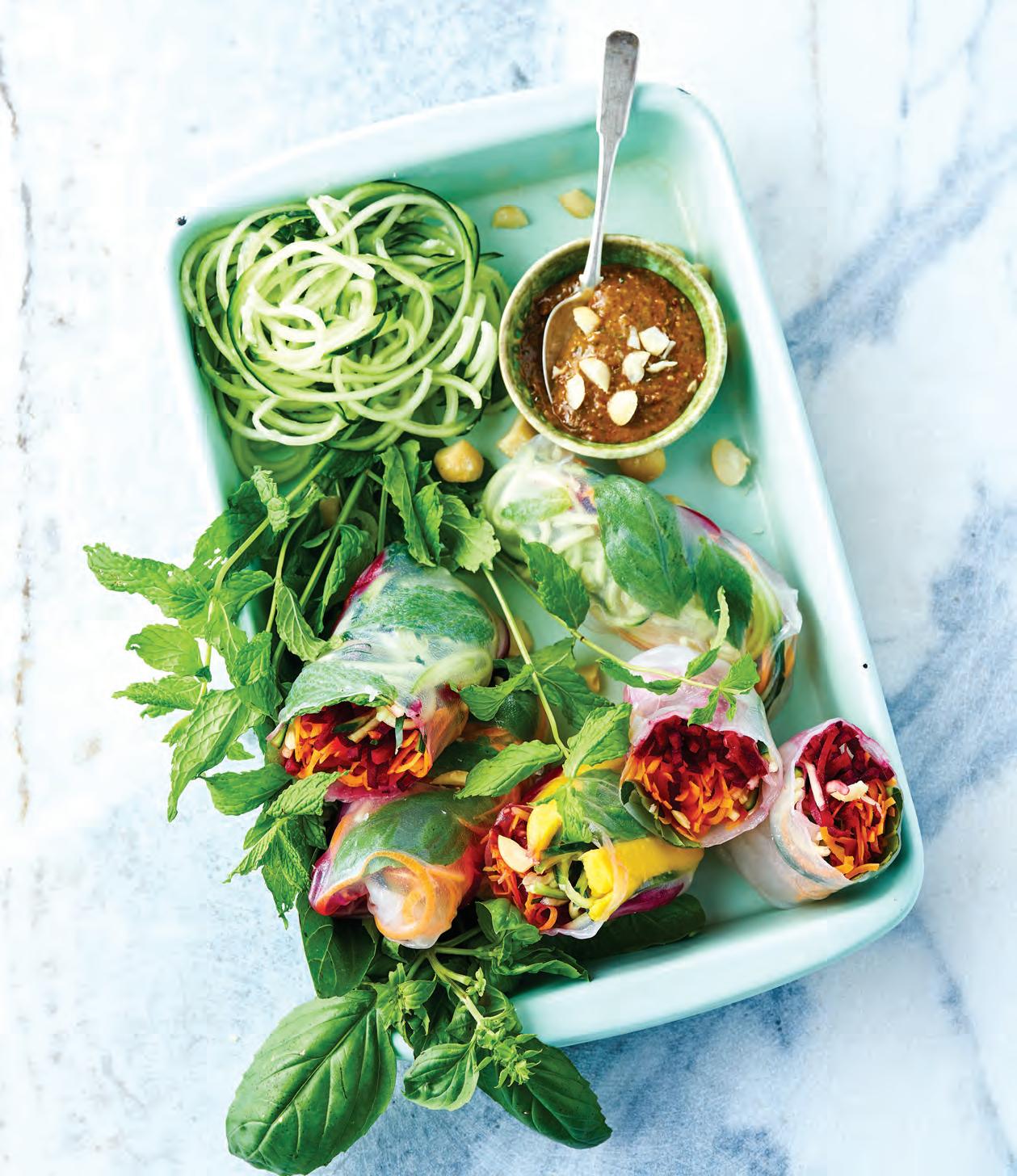
Welcome warmer weather with these spring-inspired recipes, filled with seasonal ingredients like fresh greens, artichokes, rhubarb, asparagus, strawberries and more. TURN TO PAGE 38 FOR RECIPES.

Don't let the thorny exterior intimidate you. Artichokes are full of flavor and nutrition, with folate, fiber, vitamins C and K, and loads of antioxidants.
According to Chinese medicine, spring is time to feed your liver and gallbladder to smooth the flow of Qi (energy) through your body. Foods of the season include leafy greens, artichokes, peas and strawberries. Sour tastes like lemon and vinegar stimulate the liver, too.

SERVES 6 TO 8
2 tablespoons olive oil
2 shallots, diced
4 cloves garlic, minced
1 cup Arborio rice
½ cup dry white wine
2½ cups warm vegetable stock
½ cup Parmesan cheese
1
⁄3 cup mascarpone cheese
1 tablespoon lemon zest
1½ cups fresh peas, quickly blanched
Kosher or sea salt and white pepper, to taste
Pea tendrils, to garnish
Lemon wedges
1. Heat olive oil in a large skillet over medium-high heat. Add shallots, and sauté until translucent. Add garlic, and sauté about 1 minute. Add rice, making sure to stir around in olive oil so that each granule is coated; toast about 90 seconds.
2. Remove skillet from heat, and add white wine. Return pan to heat, and stir rice until all wine has been absorbed. Next, start adding warm vegetable stock ½ cup at a time, making sure not to add more until previous addition has been absorbed.
3. Once rice is just tender, add cheeses and combine. Add lemon zest and previously blanched peas, and carefully combine into risotto. Remove from heat, and season with salt and pepper. Garnish with pea tendrils if available and a squeeze or two of lemon juice to serve.
PER SERVING: 206 CAL; 5 G PROTEIN;
10 G FAT; 24 G CARB (1 G SUGARS);
270 MG SODIUM; 2 G FIBER
Grilled Artichokes with Mustard-Greens Pesto SERVES 6 TO 8
1 pound mustard greens, washed, tough stems discarded, coarsely chopped
½ cup pecan halves, toasted, plus extra for garnish
2 cloves garlic, minced
½ cup extra-virgin olive oil
1 teaspoon kosher or sea salt, plus more for grilling
8 artichokes, cut in half
1. Bring a large pot of water to boil. Add greens, and cook 1 minute, until bright green and tender. Drain greens in a colander, and let cool to room temperature (or rinse with cool water). Gently squeeze greens with hands to remove excess water.
2. Place greens in a food processor with pecans and garlic. Pulse until finely chopped. Add oil and salt; pulse until thoroughly incorporated.
3. Cut 1 inch off top of each artichoke half. Remove outer woody layer of leaves and inner thistles. Steam artichokes 30 minutes, until tender and easily pierced with a paring knife. Shock in an ice bath, and pat dry before grilling.
4. Turn grill up to high heat. Oil grates, and brush cut side of artichokes with oil to prevent sticking. Sprinkle each side with salt, and grill cut side down, 2–3 minutes. (If you don’t have a grill, turn oven broiler to high. Place steamed artichokes on a parchment-lined baking sheet, cut side up; broil 5 minutes, until edges are browned.)
5. To serve, place artichokes cut side up on a platter. Drizzle with pesto, and top with extra pecans, if desired. Can also serve artichokes with pesto as dip in a small bowl. Simply peel leaves, and dip in pesto.
PER SERVING: 248 CAL; 4 G PROTEIN; 12 G FAT; 25 G CARB (0 G SUGARS); 108 MG SODIUM; 4 G FIBER
Curry Kohlrabi Fries
SERVES 4
1 teaspoon cumin
1 teaspoon coriander
½ teaspoon turmeric
½ teaspoon ancho chili powder
¼ teaspoon fenugreek
¼ teaspoon black pepper
2 tablespoons kosher or sea salt
3 kohlrabi bulbs, leaves and stems removed
¼ cup olive oil
TANGY YOGURT SAUCE
½ cup Greek yogurt
Juice of ½ lemon
2 teaspoons dried dill
¼ teaspoon paprika
1. Preheat oven to 425°. In a small mixing bowl, combine spices and salt.
2. Peel kohlrabi, and cut into ¼-inch-thick strips. Toss with olive oil in a large bowl. Add spice mix, and toss to coat each strip. Spread in a single layer on a baking sheet.
3. Bake 15 minutes. Flip, and bake 10 more minutes.
4. Combine all sauce ingredients. Serve with warm fries. PER SERVING: 61 CAL; 2 G PROTEIN; 1 G FAT; 11 G CARB (0 MG SUGARS); 52 MG SODIUM; 2 G FIBER
Watercress and ShavedAsparagus Salad with Grapefruit Vinaigrette
SERVES 8
¼ pound asparagus
½ bunch each leafy greens— butter lettuce, arugula and frisée
2 cups watercress
½ cup broccoli sprouts (alfalfa, clover or radish sprouts work, too)
4 fennel bulbs, ferns removed
¼ cup plus 3 tablespoons olive oil, divided
1½ teaspoons salt, divided
4 ounces grapefruit juice
¼ cup honey
1 tablespoon fresh thyme, minced
2 tablespoons fresh mint, minced
1. Wash asparagus, and pat dry. Cut tips off, saving for later. Using a peeler, shave the asparagus into long strips. Wash and toss leafy greens, watercress, sprouts and shaved asparagus together.
2. Heat a pot of water to boiling, and heat oven to 375°. Add fennel bulbs to pot, and cook 10 minutes, until slightly transparent and tender. Carefully remove bulbs, and shock in an ice bath. Julienne, and toss with 3 tablespoons olive oil and ½ teaspoon salt. Place on a parchment-lined
sheet tray, and roast until tender and sweet, about 15 minutes.
3. In a medium bowl, whisk together grapefruit juice, honey, thyme, mint and 1 teaspoon salt. Slowly drizzle in ¼ cup olive oil while whisking to create an emulsion. Season to taste.
4. Add asparagus tips and fennel to leafy greens. Dress salad just before serving.
PER SERVING: 104 CAL; 2 G PROTEIN; 4 G FAT; 15 G CARB (5 G SUGARS); 129 MG SODIUM; 3 G FIBER
Confit with Maple Sorbet SERVES 4
1 pound rhubarb, washed and cut into 1-inch pieces
¾ cup coconut sugar
2 tablespoons water
½ pound strawberries, washed, hulled and sliced, if large
3 cups oat milk (can also use coconut, cashew or vanilla soy milk)
2⁄3 cup maple syrup
1⁄8 teaspoon kosher or sea salt
¼ teaspoon almond extract
1. Place rhubarb in a medium saucepan. Add sugar and water; stir to combine.
2. Cover, and simmer over medium-low heat until rhubarb is tender, 5–7 minutes, shaking pan occasionally to prevent sticking. (If you stir, rhubarb will break up.) Remove from heat, and fold in strawberries.
3. To make sorbet, combine milk, maple syrup, salt and almond extract in an ice cream maker or bowl. Freeze according to ice cream maker’s instructions, or place in a loaf pan and freeze 4 hours to overnight.
4. To serve, spoon sorbet into small bowls and top with warm or chilled strawberry rhubarb confit.
PER SERVING: 205 CAL; 1 G PROTEIN; 0 G FAT; 49 G CARB (43 G SUGARS); 23 MG SODIUM; 2 G FIBER
Optimum Wellness is excited to partner with Johnson & Wales University (JWU). Leilah Rice, Thomas Grabe, Amanda Fischer, Julianne Williams, Kevin Knaus and Chef Adam Sacks (L to R) developed these recipes. Known as a recognized leader in culinary education, JWU is changing the way the world eats. For info, visit jwu.edu/denver.































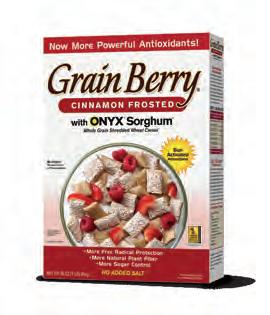
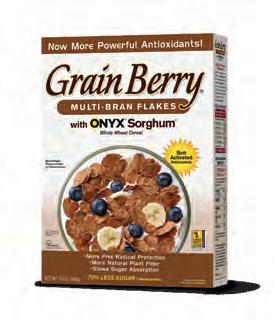

FLAVOR WILL DEVELOP WITH TIME, SO PLAN TO MAKE AHEAD AND USE IN SEVERAL TO-GO LUNCHES THROUGHOUT THE WEEK.
Think you don’t have enough time to make your own lunch? Here are four simple, tasty make-ahead options that will garner the envy of your office-mates.
BY GENEVIEVE DOLLPHOTOS: AARON COLUSSI | FOOD STYLING: ERIC LESKOVAR | PROP STYLING: NICOLE DOMINIC

This creamy dip is an excellent centerpiece for a platter-style lunch. Serve alongside pita chips, raw vegetable sticks and olives. Or pair with a simple chickpea salad: toss a can of chickpeas with lemon juice, fresh parsley, salt and pepper. SERVES 4
1 medium eggplant, cut into ½-inch rounds
1 medium red bell pepper, large pieces
6 tablespoons olive oil, divided
1 teaspoon salt, divided Freshly ground pepper
2 tablespoons lemon juice
1 small garlic clove, minced Feta cheese, for garnish
1. Preheat oven to 425°. Line a large baking sheet with parchment paper. Place eggplant and pepper slices on sheet, and brush with 2 tablespoons olive oil, ½ teaspoon salt and freshly ground pepper. Spread in a single layer. Roast for about 20 minutes, until eggplant is golden.
2. Transfer vegetables to a blender or food processor. Add remaining 4 tablespoons olive oil, lemon juice, garlic and remaining ½ teaspoon salt. Blend until smooth and creamy.
3. Sprinkle with feta and drizzle with olive oil before serving. Store in fridge for up to 1 week.
PER SERVING: 243 CAL; 3 G PROTEIN; 22 G FAT; 11 G CARB (5 G SUGARS); 664 MG SODIUM; 5 G FIBER
This salad comes together quickly and makes a large batch, perfect for hosting spring lunch with friends. If cooking for only one or two, the recipe can easily be cut in half. SERVES 6
3 cups water
1½ cups quinoa
¾ teaspoon salt
3 cups thinly sliced red cabbage
4 stalks celery, small dice
4 medium carrots, small dice
½ medium cucumber, small dice
3 green onions; green parts only, thinly sliced
2 tablespoons sesame seeds
DRESSING
¼ cup rice vinegar
¼ cup tamari or soy sauce
Zest of 1 lime
3 tablespoons lime juice
3 tablespoons toasted sesame oil
1 teaspoon grated ginger
1. Bring water to a boil in a medium saucepan. Add quinoa and salt, cover, and reduce to a simmer. Cook about 20 minutes, until water is absorbed. Turn off heat, and steam with lid on for 5 minutes. Transfer to a baking sheet, and spread out to cool. Place in fridge until quinoa reaches room temperature.
2. Meanwhile, combine vegetables and sesame seeds in a large bowl.
3. In a small bowl, whisk together dressing ingredients. Toss with vegetables to combine.
4. Stir in cooled quinoa. Season to taste.
PER SERVING: 278 CAL; 9 G PROTEIN; 11 G FAT; 35 G CARB (3 G SUGARS); 1,017 MG SODIUM; 6 G FIBER
FOR AN EXTRAHEARTY MEAL, TOP SALAD WITH POACHED SALMON.

A delectable medley of flavors and textures. This salad becomes more delicious when marinated overnight— ideal for a make-ahead lunch. Add extra pepperoncini peppers if you prefer a spicy dish. SERVES 4

3 cups bite-sized cauliflower florets
½ medium cucumber
1 (15-ounce) can cannellini beans
6 ounces summer sausage, small dice
½ cup chopped marinated artichokes
½ cup chopped green olives
3 tablespoons olive oil
2 tablespoons lemon juice
2 tablespoons apple cider vinegar
2 tablespoons chopped pepperoncini peppers
1 teaspoon salt
Freshly ground pepper
1. Place 2 inches of water and a steamer basket in a medium pot. Add cauliflower. Cover, and bring to a simmer. Cook 7 minutes, until barely tender. Transfer cauliflower to a bowl to cool slightly.
2. Quarter cucumber lengthwise, and slice into ½-inch pieces.
3. Combine all ingredients in a large bowl. Adjust flavors to taste.
PER SERVING: 445 CAL; 18 G PROTEIN; 27 G FAT; 34 G CARB (3 G SUGARS); 1,621 MG SODIUM; 10 G FIBER
TO SAVE TIME, PURCHASE CAULIFLOWER FLORETS INSTEAD OF A WHOLE CAULIFLOWER. SLICE IF NEEDED TO ENSURE BITE-SIZED PIECES.
ALTERNATIVELY, MARINATE WHOLE CHICKEN BREASTS IN SAUCE FOR SEVERAL HOURS, GRILL, AND THEN SLICE.
An egg-free alternative to a classic Caesar dressing, avocado provides a creamy richness that complements the robust cruciferous vegetables. Extra dressing can be stored in the refrigerator up to one week. SERVES 4
1 pound boneless, skinless chicken breasts, cut into ½-inch slices
2 tablespoons balsamic vinegar
2 tablespoons tamari or soy sauce
2 tablespoons olive oil
1 teaspoon mustard
4 leaves curly kale, stems removed and leaves chopped
1 cup thinly sliced green cabbage
¼ cup grated Parmesan
¼ cup roasted sunflower seeds
1 ⁄3 cup olive oil
¼ cup lemon juice

¼ medium avocado
2 small garlic cloves, roughly chopped
½ teaspoon salt
Freshly ground pepper
4 large wholewheat wraps
1. Preheat oven to 375°.
2. Place chicken in an 8x8-inch baking dish. In a small bowl, whisk together balsamic vinegar, tamari, olive oil and mustard. Pour over chicken, making sure to coat well. Bake about 20 minutes, until cooked through.
3. Place kale in a large bowl, and massage with hands for about 1 minute, until kale begins to wilt and reduce in volume. Stir in cabbage, Parmesan and sunflower seeds.
4. In a blender or small food processor, add olive oil, lemon juice,
avocado, garlic, salt and a generous amount of freshly ground pepper. Process until smooth. Dressing will be thick but pourable.
5. Transfer chicken slices to a cutting board, and roughly chop into bite-sized pieces.
6. Fill each wrap with chicken, kale mix and a generous drizzle of dressing.

My background is in naturopathic family medicine, as a primary care doctor. I had a practice for over 20 years, serving over 12,000 patients. I’m all about well-being. I love that we can put things in our bodies every single day and surround ourselves with amazing opportunities to up-level our well-being. That is why I founded Optimum Wellness 20 years ago, and why I founded Healthy Skoop in 2012. Here’s to being the most awesome version of yourself!





 -Dr. James Rouse
-Dr. James Rouse
More than 500 readers submitted entries for our debut vegan-recipe contest. These four delicious, plant-based creations are among the 20 that rose to the top.
A take on the traditional pasta, but with almonds and cashews in place of heavy cream or butter, for a delicious vegan option. SERVES 4
BY EMMA RYAN1 box pasta noodles (try recipe with Barilla Red Lentil Rotini or Penne)
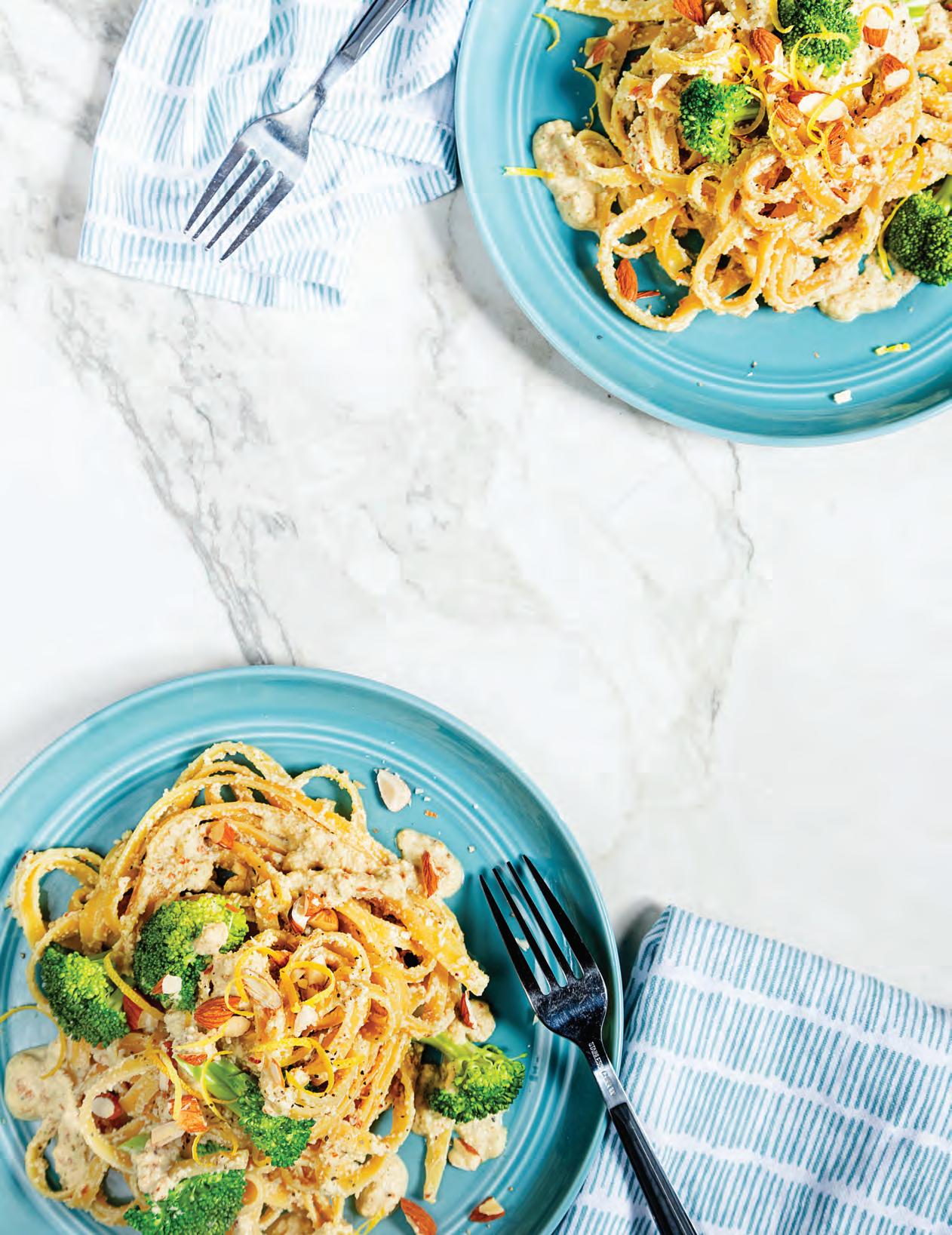
¾ cup Simple Truth
almonds
¾ cup Simple Truth cashews
1 cup water
¼ cup nutritional yeast
1 tablespoon garlic, minced
1 tablespoon dried parsley
1 lemon, juiced
2 teaspoons salt
1 teaspoon fresh-ground black pepper

1. Cook pasta according to box directions.
2. As noodles cook, make sauce. Add all remaining ingredients into a high-speed blender. Blend on high, until smooth and creamy. Store in an airtight container in fridge, or serve immediately with pasta.
TIP Add some grilled tofu, broccoli, lemon zest or roasted brussels sprouts to your Alfredo. PER SERVING: 784
DOWNLOAD THE FULL LIST OF WINNING RECIPES IN OUR NEW EBOOK AT LIVENATURALLYMAGAZINE.COM/ VEGAN-RECIPE-EBOOK.
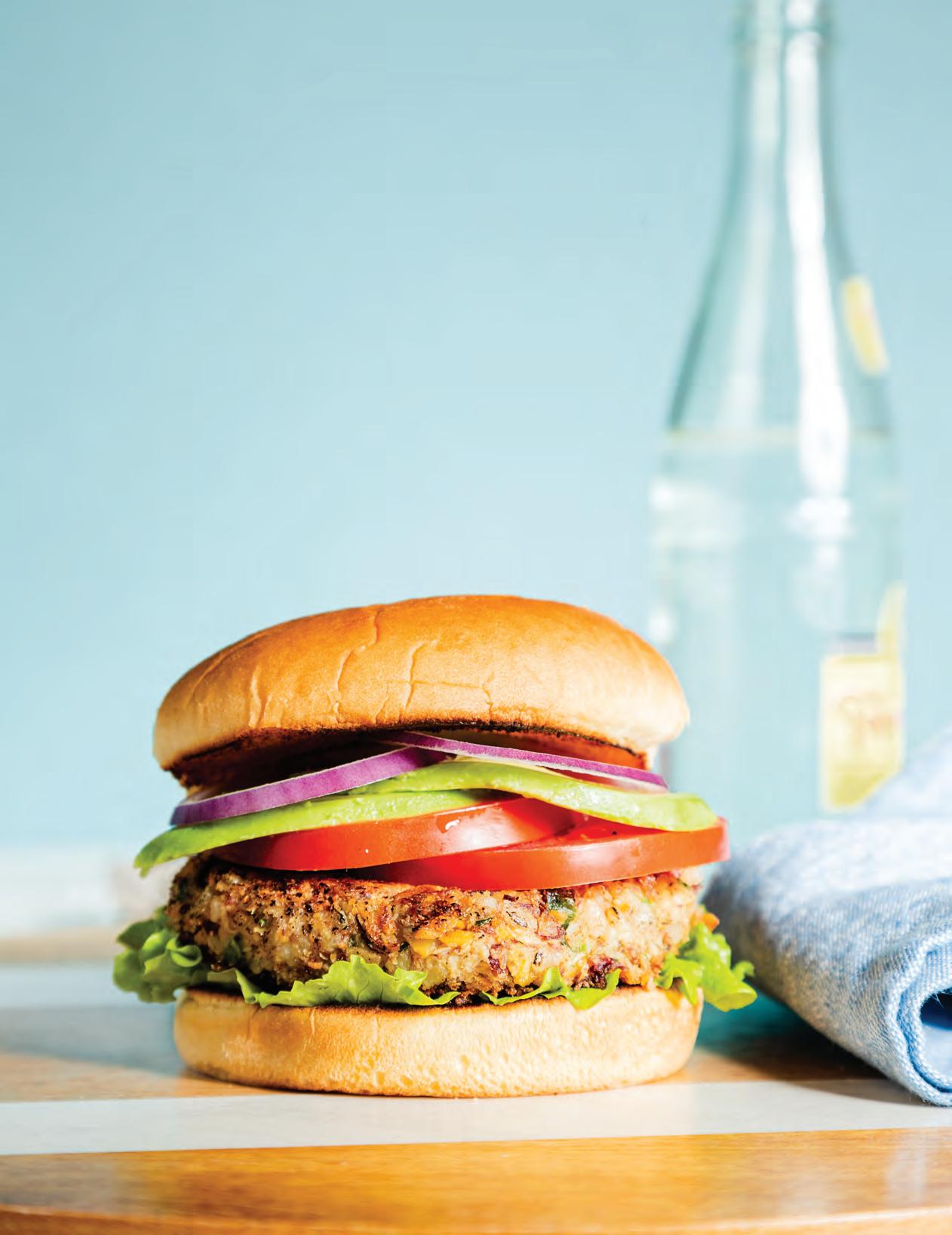
This meatless, dairy-free recipe has protein, fiber and the benefits of healthy fats. Try it with lettuce, diced tomato and avocado. SERVES 4
BY CYNTHIA BELLINI1 (6.5-ounce) jar artichoke hearts, drained and quartered
1 teaspoon garlic, chopped
¼ cup green onions, chopped
3 tablespoons fresh parsley, chopped, or 2 teaspoons dried
¾ cup Simple Truth garbanzo beans, drained and rinsed
¾ cup Simple Truth kidney or black beans, drained and rinsed
3 tablespoons ground flaxseed, regular or golden
2 tablespoons roasted tahini, or other nut butter
4 generous twists of freshly ground black pepper
½ cup cooked brown rice or millet
1. Place all ingredients except rice or millet in a food processor; pulse about eight times, until blended. Scrape down sides, and pulse another six times. Do not overprocess. Transfer to a bowl, and gently stir in cooked rice or millet.
2. Divide mixture into four portions, and form into ½-inch-thick patties.
3. Heat a large, nonstick frying pan over medium heat, and coat with cooking spray. Fry burgers until bottoms are brown, about 5 minutes. Spray tops of burgers with cooking spray, and flip. Cook until brown, about 5 minutes. Serve on buns, with lettuce, diced tomato and sliced avocado, if desired. PER SERVING: 214 CAL; 9G PROTEIN; 7G FAT; 32G CARB (1G SUGARS); 317MG SODIUM; 10G FIBER
We asked recipe contestants to try and use Simple Truth ingredients when possible, but feel free to use your favorite brands in all of these dishes!
This recipe calls for grilling the tofu on an outside grill. If not available, use a grill pan on the stovetop.

A quick and easy appetizer or light entrée, with a blend of sweet, spicy and tangy flavors. SERVES 4
BY DALJEET SINGH14 ounces Simple Truth firm tofu
2 teaspoons salt, divided
2 teaspoons
Simple Truth chili powder
4 tablespoons vegetable oil, divided
3 teaspoons fresh lime juice
1 cup fresh corn kernels, lightly roasted
1 cup semi-ripe mango, peeled and diced
¾ cup red onion, chopped
½ cup jalapeno peppers, seeded and chopped
¼ cup fresh cilantro leaves, coarsely chopped
1. Drain and rinse tofu; place on a plate and pat dry with a paper towel. Cut tofu block into four equal pieces; set aside on plate.
2. Combine 1 teaspoon salt with chili powder in a small bowl; mix well. Rub this mixture on both sides of tofu pieces.
3. For relish, whisk 2 tablespoons oil with lime juice and 1 teaspoon salt in a medium-sized bowl. Add corn, mango, red onion, jalapeno and cilantro. Toss, and set aside.
4. Preheat a grill to medium-high heat. (If a grill is not available, use a grill pan over a stove.) Oil racks with remaining oil. Place tofu pieces on rack, and cook, with grill lid (or grill pan lid) down, for 2 minutes. Rotate about 90 degrees, and cook, with lid down (or on pan), for another 2 minutes. Turn pieces over, and cook the other side the same way for 4 minutes.
5. Remove from grill or pan, and place tofu on four serving plates. Divide relish into four equal parts, and serve over tofu.
SHOP RECIPES ON OUR WEBSITE

Creamy layers of blueberry and vanilla “cheesecake” atop a naturally sweet crust of Medjool dates, pecans and slightly salty roasted almonds. Topped with fresh blueberries and coconut shreds for a blissful dessert.
MAKES 8–12 BARS, DEPENDING ON CUT SIZE
BY MEGHAN SHOOKMAN1 cup coconut milk from
2 cans Simple Truth coconut milk, divided
1½ cups pitted Medjool dates
1 cup Simple Truth sea salt roasted almonds
1 cup toasted pecan pieces
1 cup raw cashews; soaked overnight and drained, divided
4 tablespoons Simple Truth maple syrup, divided
1 teaspoon Simple Truth Madagascar vanilla extract, divided
1 cup desiccated coconut shreds, divided
½ cup Simple Truth frozen blueberries
1. Place 1 can of coconut milk in the fridge the night before making the cheesecake.
2. To make crust, add dates, almonds and pecans to a food processor; pulse until ingredients clump together in a crust-like consistency. Transfer to an 8x8-inch loaf pan, and press until uniform and flat. Place in freezer.
3. To make vanilla layer, add ½ cup of soaked cashews to food processor. Pulse until a smooth paste is formed. Add ½ cup coconut milk (from can placed in the fridge; scoop the cream from the top, and use the liquid), 2 tablespoons maple syrup, ½ teaspoon vanilla and ½ cup desiccated coconut. Process another 15-20 seconds.
4. Pull loaf pan from freezer, and layer vanilla cheesecake on top of crust. Return pan to freezer; allow 2 hours for vanilla layer to set.
5. To make blueberry layer, add ½ cup soaked cashews to food processor. Pulse until a smooth paste is formed. Add ½ cup coconut milk (from can placed in the fridge; scoop the cream from the top, and use the liquid), 2 tablespoons maple syrup, ½ teaspoon vanilla, ½ cup of desiccated coconut and ½ cup frozen blueberries. Pulse again another 15-20 seconds.
6. Pull pan out of freezer, and layer blueberry cheesecake on top of frozen vanilla layer. Garnish top with additional blueberries and coconut shreds, if desired. Allow to freeze 2 hours.
7. Remove from freezer, and allow to thaw 20–30 minutes. Slice into bars.
PER SERVING: 474 CAL; 9 G PROTEIN;
32 G FAT; 45 G CARB (30 G SUGARS);
8 MG SODIUM; 7 G FIBER
VALUES CALCULATED AT NUTRITIONDATA.SELF.COM
TIP
Be patient when processing ingredients in the food processor. The smoother the texture, the better the bars!









Nestled in the heel of Italy’s boot, this southern region celebrates natural flavors and simplicity in its cuisine.
BY REBECCA HEATONLa cucina povera. It’s an Italian phrase that means “peasant cooking” or “cooking of the poor.” It’s a simple culinary style: making do with what you’ve got to transform fresh, local ingredients into delicious dishes. In Italy, the southern region of Puglia, located in the upper heel of the country’s boot, is a shining example of what la cucina povera is all about.
“Puglia is a region that celebrates simplicity,” says Valentina Harris, an award-winning author of more than 40 books on Italian food, including The Italian Regional Cookbook (Lorenz, 2018). “Its cuisine combines the products of the region’s long coastline with their tradition of sheep farming, so there is plenty of fish and seafood, along with age-old recipes for lamb and mutton,” says Harris. “Binding them together is the very special olive oil of Bitonto and Alberobello, and the extraordinary and very special bread of Altamura, with its dense texture and flavor.” Also unique to the region is the ear-like pasta shape called orecchiette.

Famous for its whitewashed, Mediterraneanstyle towns; conical “trulli” houses; and centuries-old farmlands, Puglia hosts Italy’s longest coastline. It stretches 250 miles, which made it ripe for conquest in earlier times. Greeks, Romans, Normans and Spaniards all left their mark, colonizing, invading or conquering, starting as far back as the eighth century B.C. And the

This is delicious with arugula salad or a garlicky roasted bell pepper salad as part of an antipasto.
SERVES 4 TO 5
‘Fave’ is the Italian name for the broad bean, but in Puglia, where this recipe comes from, the word is also used to describe this dense, oily mash based on broad beans and potatoes. Along with orecchiette, the ear-shaped pasta distinctive to the region, fave is a staple food. It is usually eaten as a first main course (primo piatto), as an alternative to pasta or risotto. Traditionally, it is topped with boiled bitter greens, creating a wonderful combination of textures and flavors, as well as being extremely nutritious and cheap to make.
1 ¼ cups dried broad/fava beans
14 ounces potatoes
About 2 large handfuls greens, such as cabbage or kale
½ cup extra-virgin olive oil
Sea salt
convergence of these influences is what makes the region stand out from other areas of Italy, particularly when it comes to food.
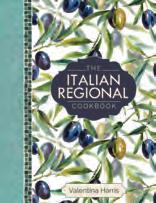
“Partly the link to ancient Greece; partly the shepherding tradition, with its long, ancient sheep trails that snake down from L’Aquila in the Abruzzi to Lecce; and partly the proximity to the great plain of Le Murge, which for thousands of years has provided some of the best hard wheat for pasta-making in the whole world—all of this makes Puglia special,” says Harris.
Sights and flavors of Puglia (L to R): Trulli houses of Alberobello, the famous beach and coast of Polignano a Mare, and orecchiette, the “ear-like” pasta of Puglia.

1. Put beans in a large pan or flameproof earthenware pot and cover generously with cold water. Bring to a boil, lower heat, and simmer gently for 2 hours.
2. Meanwhile, peel potatoes, cut into 1-inch slices and put in a bowl of cold water. Leave to soak until beans are ready.
3. After 2 hours, the pan of beans will have developed a foamy scum. Skim this off, and then pour away most of the water by tilting pan carefully over the sink.
A not-to-be-missed dish is the region’s famous macco di fave, white fava bean purée served with bitter greens. “It will be doused in a dense slick of local olive oil and served with thick slabs of Pane di Altamura,” she says. “Wash it down with plenty of the amazing red wine of the region—in particular the rich and heady Negroamaro—then enjoy a long siesta.” We’re in.
4. Drain potato slices and spread them over the semi-drained broad beans,

then top up to the level of the potatoes with fresh water. Add a pinch of salt and return pan to heat for a further 30–40 minutes.
5. Meanwhile, boil greens in salted water for 10–20 minutes, until tender.

6. Adjust seasoning to taste, and then serve purée in heated shallow bowls, with a generous swirl of olive oil on top of each portion and a topping of greens.
PER SERVING: 289 CAL; 6 G PROTEIN; 22 G FAT; 20 G CARB; 496 MG SODIUM; 2 G FIBER
NUTRITIONAL VALUES CALCULATED AT NUTRITIONDATA.SELF.COM
VISIT LIVENATURALLYMAGAZINE.COM FOR MORE DISHES FROM PUGLIA, INCLUDING STUFFED BAKED PEPPER PUGLIESE STYLE AND ORECCHIETTE WITH CAULIFLOWER.
When it’s good, inflammation can heal injuries and ward off foreign invaders. But when it’s bad, it can ignite a host of conditions and diseases. We break down the science.
 BY NANCY COULTER-PARKER
BY NANCY COULTER-PARKER
“inflammation” is thrown around a lot. But what exactly is it? Is inflammation what happens to muscles or tendons when we sprain them? Does it cause chronic conditions like heart disease? Is it a good or a bad thing?
It’s really all of the above. Inflammation can be acute or chronic, and both friend and foe.

Acute inflammation is the body’s short-term response to injury and usually results in healing, says Timothy Mazzola, M.D., of Boulder, Colo., a nonoperative orthopedist who specializes in regenerative orthopedics (nonsurgical treatments to injury). “When you’re fighting cancer or infection is when your immune system needs to go to bat for you,” says Mazzola. “In my field, where inflammation is so key is in the initiation of the healing response. When you have an injury that your body needs to respond to, to be able to heal itself, that requires inflammation. It is the first step of healing.”
Similarly, when pathogens like viruses, bacteria or fungi infect the body, the immune system fights these infections and causes inflammation. Other external stimuli, such as certain unhealthy dietary factors, cigarette smoking, and exposure to environmental pollutants and chemicals can also lead to acute inflammation but also, more significantly, increased levels of chronic inflammation. Obesity can even trigger inflammatory responses in fat tissue, leading to chronic systemic inflammation, explains Frank B. Hu, M.D., Ph.D., professor and Department of Nutrition chair at the Harvard T.H. Chan School of Public Health. Hence, the role of inflammation should be to initiate healing and get rid of unwanted stimuli in the body. “In a normal immune response, physiological inflammation is essential for the immune system to fight off foreign invaders and heal injuries,” says Hu. “However, long-term systemic inflammation could trigger cascades of reactions that increase risk of cardiovascular diseases, diabetes, some cancers and respiratory diseases.”
When inflammation doesn’t shut off, it turns into long-term or chronic inflammation, which has been associated with increased risk of succumbing to myriad health conditions and disease. Here’s how it works: The body’s cells produce proteins called cytokines, which are necessary to stimulate the immune response, regulating the body’s response to infection or disease. Yet, the presence of chronic inflammation means that our proinflammatory cytokines never turn off, perpetuating the inflammation cycle.
“Once infection or an injury is fought, things are supposed to go back to homeostasis, with the immune system at-theready but not locked in the on position,” says Mazzola. “The latter is what causes systematic inflammation and can lead cancer, heart disease and conditions like osteoarthritis to progress more rapidly. That’s where inflammation is not cool.”
“I think exercise is the most profound anti-inflammatory, as long as you are not overdoing it. If you can do the proper amount and intensity and duration, then you can actually decrease your overall inflammation,” says Mazzola. As a general goal, aim for at least 30 minutes of moderate physical activity every day, whether it’s walking, biking, going to the gym or even gardening to move your body.

Obesity, for instance, is associated with chronic inflammation. “Inflammation may be an underlying reason for the development of many obesity comorbidities, such as heart disease, diabetes and some cancers,” says Hu. “Weight loss and maintaining a healthy weight can reduce levels of proinflammatory cytokines.”
So what can we do about inflammation? “Shutting it off with ibuprofen or NSAIDs [nonsteroidal anti-inflammatory drugs] can help with pain but might also impair the healing response,” says Mazzola. Instead, a healthy diet and lifestyle have been shown to help manage chronic and low-grade inflammation.
Hu notes that physical activity is a key to maintaining a healthy weight and therefore controlling inflammation. On the flip side, cigarette smoking releases numerous chemicals with proinflammatory properties. Sleep patterns also influence inflammation.
“There is some evidence that links sleep disturbance, inadequate sleep duration and obstructive sleep apnea to increased levels of inflammation,” says Hu. Poor sleep can increase production of the hormone cortisol, which functions in part to reduce inflammation. With chronic inflammation (and sleep deprivation), cortisol is constantly being created and, in turn, suppresses the immune system. This puts the body at increased risk for disease and ailments.

Hu recommends plant-based foods, such as vegetables (especially dark-yellow and leafy-green vegetables and tomatoes); fruits including blueberries, blackberries, oranges, apples and strawberries; foods high in healthy fats—i.e., polyunsaturated and monounsaturated fatty acids—such as walnuts and other nuts, extra-virgin olive oil, seeds and seed oils, and fatty fish and seafoods, which contain marine omega-3s; and whole grains. “All of these have been associated with lower levels of inflammation,” says Hu, adding that coffee, tea and dark chocolate rich in polyphenols may reduce inflammation as well.
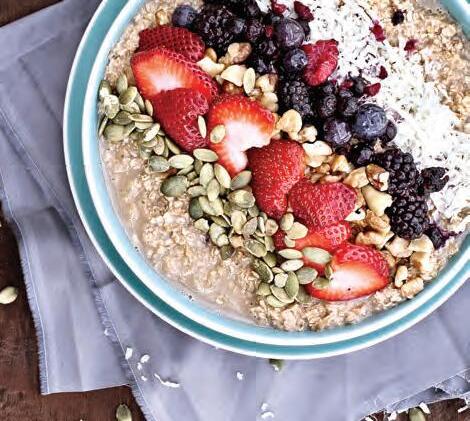
As with many ailments, a healthy diet can mitigate inflammation. Many recommended diets—including the U.S. dietary guidelines, Mediterranean or Asianstyle eating, and a vegetarian diet—mesh well with anti-inflammatory eating. “All of these diets share in common more plant-based choices, more fruits and vegetables, whole grains, legumes and nuts,” says Jeffrey Blumberg, Ph.D., research professor at the Friedman School of Nutrition Science and Policy at Tufts University. “They all have constituent nutrients, vitamins and minerals, and fatty acids, and they contain bioactive components that may help inflammation. If you eat a healthy diet, big-scale studies and smaller clinical trials have shown that you will be at a lower risk for diseases, such as heart disease or certain cancers.”

The inflammation cycle can be fed by proinflammatory foods, including refined carbohydrates such as white bread and pastries, sugar-sweetened beverages, red meat (burgers and steaks), and processed meat, including hot dogs, sausage and bacon. Blumberg adds, “Processed foods and sugar are the real problems that cause inflammation.” Ingesting sugar, such as in a soda, causes glucose levels to go up quickly, so insulin goes up quickly. “It’s these spikes that are problematic,” he says. Blumberg notes that fruit, on the other hand, is OK, because even though it contains natural sugars, it doesn’t cause the spikes, because the body absorbs it more slowly.
Although this idea that eating healthy can ward off inflammation is nothing new, Blumberg notes that the medical world has become more savvy in its awareness and comprehension of inflammation. “We have gotten more sophisticated in understanding that inflammation stimulates oxidative stress, which affects glucose and insulin control and glucose regulation. This leads to adverse glycation [when glucose links to proteins in the body], which leads to more inflammation and oxidative stress.” Basically, if left unattended, inflammation can be a vicious cycle.
Although diet can stem inflammation, the reality is that a large percentage of the population fails to meet U.S. dietary guidelines when they eat, Blumberg says. In fact, about three-fourths of the population eats a diet low in vegetables, fruits, dairy and oils, and most Americans exceed recommendations for sugar, saturated fats, sodium and overall caloric intake, according to the National Health and Nutrition Examination Survey conducted by the National Center for Health Statistics.
“We have a big gap—in terms of micronutrients, vitamins and minerals—between what people are eating and what they actually need,” explains Blumberg. In this case, he advises that dietary supplements can help fill the gaps. For instance, if you’re not eating two to three servings of fish a week, he recommends taking fish oil supplements with omega-3 fatty acids to reduce chronic inflammation. A good multivitamin can overcome diet gaps, but it’s necessary to take them regularly. “They don’t work if you don’t comply,” he adds.
The biggest mistake, says Blumberg, is when people think they can’t do anything for inflammation. They might say, “I have type 2 diabetes; I might as well keep eating because it’s too late.” But that’s not right, cautions Blumberg. “At any stage of life, even with a chronic condition, challenging inflammation with an anti-inflammatory diet can be of benefit. You can have a better quality of life.”
Mazzola emphasizes the need for vitamin D, which is associated with reduced inflammation and yet is another vitamin we tend to be deficient in.
“Vitamin D is a hormone in your body, a fat-soluble vitamin, and is involved in a lot of the repair processes,” he explains. “So, if you are low, you are just not going to be able to heal as well. If you live north of L.A., across to northern Florida, at least through the winter months, the vast majority of the population is deficient in vitamin D for lack of sunlight. And you can’t get enough in your food. It’s worth talking about to your doctor,” he says.
“Turmeric, or curcumin, the active ingredient in turmeric, is also a powerful anti-inflammatory,” says Blumberg. Turmeric can be taken in food or as a supplement.
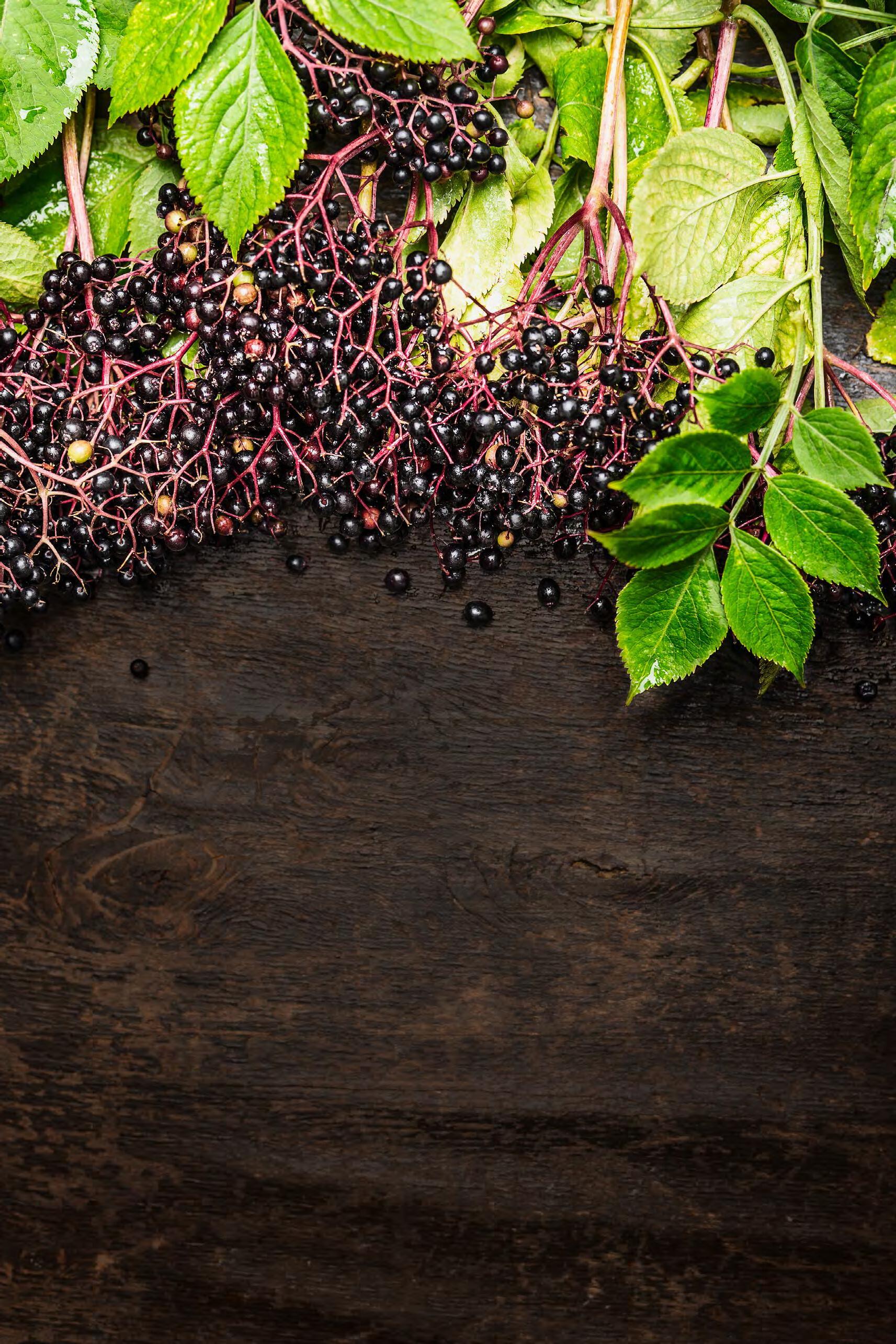







Try this Indian herb to ease stress, regulate moods, manage blood sugar and more.
BY KELLEE KATAGINative to India, the root of this plant has been used for thousands of years in Ayurvedic medicine. It’s considered an adaptogen, a natural substance that can return the body to a neutral state during times of stress. It’s a member of the nightshade family and is also called Indian ginseng.

Ashwagandha is taken to combat stress and anxiety, enhance mood, strengthen the immune system, stimulate thyroid production, manage blood sugar levels, improve endurance, and increase libido and sperm quality.

Large, definitive human studies of ashwagandha’s effects are rare, but numerous smaller studies back up millennia of anecdotal evidence. A review in the Journal of Alternative and Complementary Medicine (JACM) cited five human studies that showed effectiveness against stress and anxiety, as did another study published in PLOS One. Other research published in JACM found that ashwagandha root extract boosted thyroid hormones. Multiple animal studies suggest the herb may regulate blood sugar and decrease insulin resistance.
Ashwagandha is most common in extract form, but powder, capsules and even tea are also available. According to the Natural Medicines database, taking 300 mg of ashwagandha root extract twice a day after eating for 60 days may reduce stress symptoms. Do not take if pregnant or breastfeeding; some evidence suggests it could cause miscarriage. The herb can also interact with certain medications, so consult with your doctor first.
Ashwagandha derives its name from the Sanskrit words for “smell of a horse”—and for good reason. Its strong aroma is one reason it’s usually consumed in supplement form versus food.
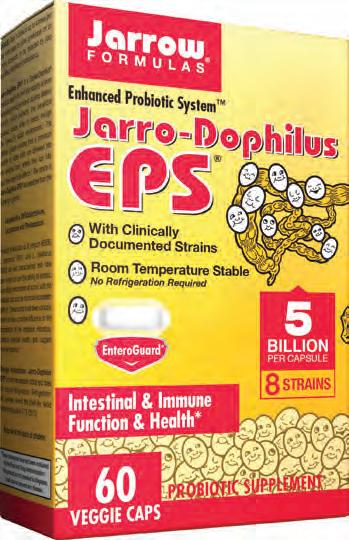







It’s easy to look forward to the longer days of spring, when everything is coming into bloom. But for some of us, as much as we love flowers and tree blossoms, spring also means seasonal allergies. In fact, it’s estimated that more than 50 million Americans suffer from allergies each year, making them the sixth-leading chronic illness in the United States, according to the American College of Allergy, Asthma and Immunology.
Although over-the-counter remedies are available, natural remedies and lifestyle and diet solutions may actually offer more long-term relief. If you have chronic inflammation, for instance, your body is more likely to react to allergens in your environment. When treating patients for seasonal allergies, Julieanne Neal, a naturopathic doctor based in Boulder, Colo., first assesses their overall inflammatory picture to see if they react to just environmental triggers or if they also react to foods. “They may have inflammation coming from environmental triggers, but there may be things in their diet that could also be contributing to mucus formation, congestion and inflammation,” she explains. If you are prone to allergies, Neal suggests avoiding inflammatory and mucus-producing consumables, such as alcohol, gluten, dairy, eggs, sugar, and fried or processed foods. “If you have too much inflammation, your cup is full, and the body will hyper-react to any other thing that comes in. If you can drain the cup of
inflammation, the body can process things better,” says Neal. Getting better sleep and decreasing stress can also alleviate symptoms, she says. “People who are really stressed are more likely to have allergies.”
Another key to treating allergies, says Neal, is to start to take preventive measures in the early spring, before allergies kick in. “You will have less traction if you wait until you start to feel symptoms to take anything.”
“It is like an inappropriate immune response. Your body acts like it has a cold or flu, but it doesn’t. Your immune system is working when it’s not supposed to be,” explains Lynn Wagner, M.D., who runs an integrative-medicine practice at BayCare Clinic in Wisconsin.
What causes the body to act like that? Cells called “mast cells,” whose job it is to release histamine during an allergic reaction. “When an allergen comes in through the nasal passages or digestive tract, and your immune system doesn’t like it, your mast cells dump a bunch of histamine in your body. That is what causes the runny eyes and congestion from the histamine overload. If you can regulate the mast cells, you will be less likely to have a reaction,” says Neal.
You can certainly take overthe-counter medicines, but there are plenty of natural remedies that can do the trick, too.
A flavonoid found in colorful fruits and vegetables, quercetin can also be taken in supplement form. It works like a natural antihistamine, and Wagner recommends taking it throughout allergy season with bromelain or vitamin C to support absorption.
Recommended dose
A typical dose is 1,000–3,000 mg daily. Start with 500 mg twice daily; you can move up to 1,000 mg three times daily.
This herb is also used for hay fever. Like quercetin, it acts as an antihistamine. Stinging nettle and quercetin can be taken individually or, says Neal, the two are often found combined in products.
Recommended dose
Start with 300–500 mg daily; you can go up to 300 mg of freeze-dried nettle two to three times a day.
“Butterbur reduces mucus production and possibly reduces leukotriene activity,” says Wagner. Leukotrienes are one of the substances mast cells release to counter an allergen, but they cause bronchoconstriction, which restricts airways in your lungs.
Recommended dose
50–100 mg daily. Be sure to choose a product that is “PA-free” or free of chemicals called pyrrolizidine alkaloids (PAs), which can harm the liver.
“Most people need some sort of anti-inflammatory support year-round throughout their life. Fish oil or flaxseed oil can help reduce inflammation in the body in general and can be helpful for allergies,” says Neal.
Recommended dose
Up to 3 grams (3,000 mg) of fish oil from a brand with a higher amount of EPA and DHA. The higher the amount, the better the quality oil.
Take it for a cold; take it for allergies. Vitamin C also has a natural antihistamine effect.
Recommended dose
Take up to 1,000 mg, three to five times a day. A possible side effect from a higher dose is diarrhea; simply lower the dose if this occurs.
Nasal spray or a neti pot can help keep your nasal-passage lining moist and keep mucus moving out. Use as needed. Or place saline solution in the shower as a reminder to use daily.
These two B vitamins, says Neal, help your body process histamine. They can be found in leafy greens or taken in supplement form. “Often, people with allergies are more depleted in these nutrients,” she says.

Recommended dose
Try 1,000–5,000 mcg of B12 and 0.5–1 mg of methylfolate daily. Neal emphasizes the need to take methylfolate, the more active and natural form of folate, as opposed to its synthetic counterpart, folic acid.
Probiotics can reduce potential for allergies by calming the immune system in your gut. “There is growing evidence to show that having gut problems, a.k.a. leaky gut, can lead to an overactivated immune system. By healing the gut, you can calm this down. This includes eating a healthy, wholefood, plant-based diet, using supplements like probiotics and possibly other gut-healing supplements,” says Wagner.
Recommended dose
Consult with a doctor, or take as directed per brand.








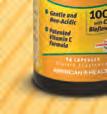

























What you need to know to get the most out of three important supplements.
 BY REBECCA HEATON
BY REBECCA HEATON
Close to 75 percent of adults in the U.S.—that’s about 170 million people—take dietary supplements, this according to the 2018 Consumer Survey on Dietary Supplements by the Council for Responsible Nutrition. The top reason: to support overall health, wellness and energy.
To get the most benefit from supplements, it’s helpful to understand how to best help your body absorb them. We caught up with Kroger’s Molly Hembree, R.D., L.D., and pharmacist Laura Clark, Pharm.D, R.Ph., for their consumption and absorption tips on their top-three recommended supplements for the average American adult.
Hembree notes that calcium is a nutrient that Americans tend to fall short on.
ABSORPTION TIPS
“Strive to get calcium in a calcium citrate form versus calcium carbonate,” says Clark. Although a carbonate is fine, it requires stomach acid to digest, so you need to take it with food. “With a citrate, you can take it on an empty stomach, and it will be just as easily absorbed as if you just ate.”
One of the best natural ways to get vitamin D is exposure to sunlight, but lack of time outside or using sunblock (or a combination) limits how much we get, says Hembree.

ABSORPTION TIPS
“In general, here in the U.S., we tend to fall short on enough iron in our diet,” says Hembree.
ABSORPTION TIPS
Iron is absorbed better when:
GETTING YOUR VITAMIN D BY SPENDING
5–30 MINUTES IN THE SUN, TWO TIMES A WEEK, WITH YOUR LIMBS EXPOSED, IS ENOUGH, SAYS HEMBREE.
Know that your body can uptake only about 500 mg of calcium at a time. “So, if you take a supplement that has 750 mg of calcium, your body won’t use that extra 250 mg very well,” says Hembree.
In supplement form, vitamin D is best absorbed in combination with calcium, notes Hembree. “If you see them together in a supplement, it’s a perfect harmony,” she says.
Unfortunately, vitamin D is not abundant from food outside of fish and egg yolks. But, according to Hembree, a number of foods are fortified with the vitamin, such as milk, cereal, margarine and dairy-alternative beverages.
Is it better to take capsules? Pills? Coated? Uncoated? Powder? Liquid? “There isn’t a dramatic difference in delivery methods,” says Clark. “As a pill enters the body, it’s going to be broken down by our stomach acid no matter what. And liquid will absorb faster but not better.” Hembree adds that for certain people, injections of certain vitamins like D or B12 are appropriate if there is a diagnosed deficiency. And vegetarians and vegans will want to avoid capsules, which are made with gelatin.
1 Consumed with a vitamin C source. “Wash your iron supplement down with a glass of orange juice,” says Hembree. Or when cooking, because iron is naturally found in meat products and legumes, cook meat or beans with vitamin C–rich vegetables, like bell peppers or broccoli. Another good bet is mixing strawberries (high in vitamin C) with an iron-fortified cereal at breakfast.
2 Taken in heme form.
“There are two different forms of iron in our diet: heme and nonheme,” explains Hembree. “Heme iron is more readily absorbed and comes from animal products—meat, poultry, fish—with some found in eggs and dairy.” Nonheme iron comes from sources like dark leafy greens, beans and nuts, and whole grains. “If you follow a vegetarian or vegan diet, you can still get iron from these foods, but you’ll need to keep in mind that you may need to eat more to have a similar effect to what you would get from meat and fish.”
“We always want to be looking at our dietary pattern first and adjusting nutrient needs with food, before reaching for a bottle to make up for any nutritional gaps.”
–MOLLYR.D.,HEMBREE, L.D.


Most commonly known as a key ingredient in hummus, tahini is great for dessert recipes, too.
BY DINA DELEASA-GONSARA paste made from ground sesame seeds, tahini is the perfect addition to a frozen “nice” cream. The crunchy pieces of pecan and sweet pineapple in this recipe add pleasant complexity to the creamy tahini.

SERVES 2 TO 4
2 cups frozen crushed pineapple
2 cups frozen banana, sliced into rounds
2⁄3 cup tahini, mixed*
2 teaspoons vanilla extract
1⁄8 teaspoon salt
¼ cup pineapple juice
¼ cup almond milk
¼ cup maple syrup
½ cup toasted pecans, chopped
¼ cup dried pineapple, chopped
Dina Deleasa-Gonsar loves to create recipes and, in particular, experiment with ingredients. See more of her creations at dishitgirl.com.
1. Line a rimmed baking sheet with parchment paper. Arrange crushed pineapple and banana on sheet in a single layer. Freeze until solid, about 2 hours.
2. Transfer fruit to a food processor; process until fruit is crumbly, about 30 seconds. Stop processor, and scrape down sides with a rubber spatula. With the motor running, pour in half of the tahini, and blend continuously for 1 minute. The bottom portion of the mixture will start to become smooth, while the top is still crumbly. Stop the processor; scrape down the sides.
3. Again, with the motor running, add in remaining tahini, repeating the process. Stop the processor as the mixture becomes smooth. Add vanilla, salt,
pineapple juice, almond milk and maple syrup to mixture, and blend until smooth and creamy.
4. Transfer to a large bowl. Fold in pecans and dried pineapple.
5. Line a lidded, airtight container or a loaf pan with wax or parchment paper. Transfer mixture to container, and freeze until solid, approximately 2 hours. *Make sure to mix the tahini well before using. You will most likely notice a separation of the oil at the top of your jar.
PER SERVING: 537 CAL; 10 G PROTEIN; 30 G FAT; 64 G CARB (36 G SUGARS); 46 MG SODIUM; 8 G FIBER NUTRITIONAL VALUES CALCULATED AT NUTRITIONDATA.SELF.COM
Your morning cup. Our life’s purpose. Our family has been crafting premium coffee for nearly 150 years. And Don Francisco’s Coffee is the result of four generations of refining our craft. We invite you to blend our traditions with yours.

